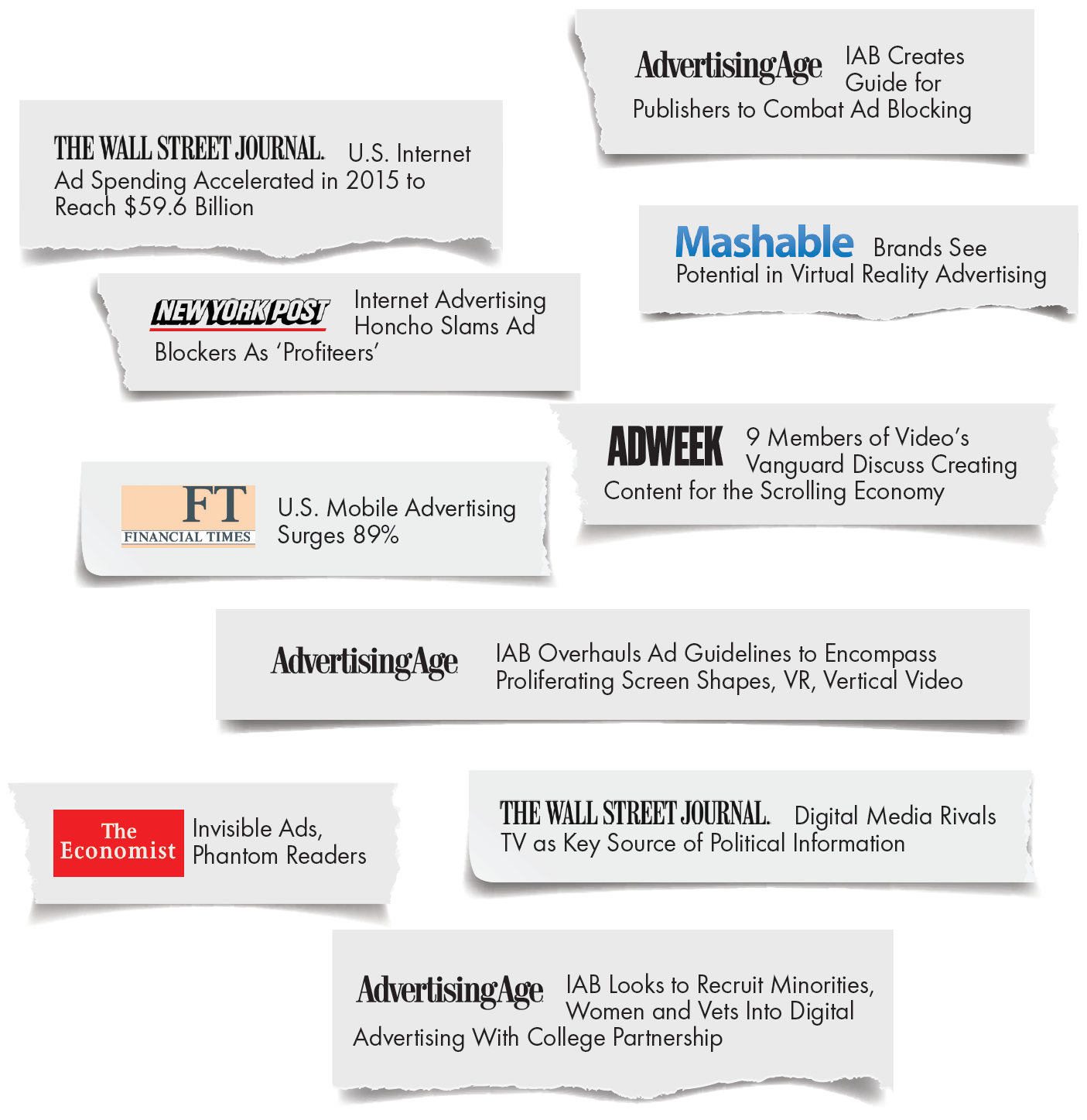Fueling Growth for IAB Members
 Marketers spent $60 billion on digital in the United States during the last 12 months—more than on any other medium, a resounding affirmation of consumers’ preference for digital media as the entry point to satisfy their needs and wants.
Marketers spent $60 billion on digital in the United States during the last 12 months—more than on any other medium, a resounding affirmation of consumers’ preference for digital media as the entry point to satisfy their needs and wants.
Enabling digital media companies, as well as their marketing and technology partners, to be invited into consumers’ lives has been IAB’s mission since our trade association’s founding 21 years ago. That work of enablement has grown more multidimensional, more complex, more political, and ultimately more fulfilling over the decades. We have the great fortune—all of us—to be working in an industry that is altering the means by which human relationships are formed and human knowledge is transferred. For the 71 men and women at IAB, our joy and fulfillment derive from helping our members accomplish these tasks as efficiently and effectively as possible.
We ended 2016 feeling quite fulfilled. IAB concentrated our resources on six themes: developing tools for enablement of technology standards; building a video agenda for growth; accelerating revenue growth in mobile; increasing value along the data chain for consumers and marketers; emphasizing further technical training for industry professionals; and advocating for policy changes that benefit our members, our industry, and society as a whole.
To bring awareness to the goal of improving online user experience, IAB and the IAB Tech Lab introduced the LEAN Principles in late 2015. In 2016, these principles became the foundation for a comprehensive program to improve user experience, including an overhaul of the IAB Standard Ad Unit Portfolio; live user experience summit meetings; and best practice guidelines to help enable change, address publishers concerns, and share experiences.
Through the efforts of the IAB Digital Video Center of Excellence , the 2016 Digital Content NewFronts was a success without precedent, with 37 publisher-presenters (nine of which were new to the NewFronts), and many standing-room-only events. In July, the industry’s top video executives and advertising companies convened at IAB’s invitation-only Video Leadership Summit to define the video agenda for the future. A robust training program for cross-platform video sales and planning, and measurement alignment with the Media Rating Council were the central recommendations to emerge from the summit’s breakout sessions; and new efforts in those areas already are underway.
Throughout 2016 much of the focus of the IAB Mobile Marketing Center of Excellence was put on practical advice for effectively reaching mobile users and global consumers across screens. Influential brand, agency, publisher, and technology leaders joined IAB and dmexco at Mobile World Congress in Barcelona in February to discuss Turning Mobile into Mobility: Innovation without Borders. Discussion focused on the need to have much more than simply a “mobile strategy,” and the desire to adopt holistic, liquid, 360-degree experiences that cross all screens. In response, the IAB Mobile Marketing and Digital Video Centers of Excellence published a report in September 2016, “Is Virtual the New Reality?” The report offers opinions from a distinguished panel of industry-leading voices in publishing, advertising, VR software, and developer platforms, analyzing virtual reality’s potential as an advertising and publishing medium.
To drive the industry’s data agenda, in 2016 IAB launched the IAB Data Center of Excellence with the mission to define boundaries and increase value along the data chain for consumers, marketers, and the ecosystem that supports them. After just a few months of operation, the Data Center released the Data Maturity Model, a diagnostic test that allows brands, agencies, publishers, and data technology vendors to determine where they—and their clients and prospects—rank in data-usage sophistication to help guide their investments, implementation, and strategy. Other data initiatives include the Attribution Primer 2.0, which is focused on buy-side attribution guidance, ensuring that the industry has a well-researched overview of the fundamental techniques and data points that practitioners use to assemble a single user-level view of media exposure across channels.
IAB continues to be a strong advocate for our members in front of the federal and state governments. With a new Presidential administration, Congress, and Senate—as well as changes in many statehouses and state legislatures—it’s more important than ever that IAB continues to educate industry regulators and elected leaders. In 2016, IAB became a leading voice at the FCC. In meetings with the Commission and through our filings with them, IAB explained the benefits of self-regulation in the digital advertising space. And in September 2016, before a room full of senior representatives from the FCC, Congress, political press, and digital media, IAB addressed the growth of digital advertising, our involvement in the key policy debates of today, and how our industry must collectively address the threat of ad-block profiteers.
As the digital media and marketing industries have exploded, IAB members demand more talent and more training programs. In 2016 we crossed a lifetime threshold of 10,000 participants in IAB Certification programs. The continued growth of these programs helps ensure that the professionals of tomorrow have the necessary knowledge and skills to help their brand clients navigate the dynamic digital marketplace.
The IAB Education Foundation is also working hard through its iDiverse initiative to prepare a diverse pool of future job candidates that reflect the audiences we serve. The Foundation has committed to a goal of “200 digital companies, 10,000 jobs, by 2020,” and developed tools like the iDiverse Non-Profit Directory to offer digital media companies the opportunity to connect with non-profits and tap into their mentoring, volunteering, and training programs.
2016 was a productive year for IAB’s efforts on our members’ behalf, and we are doubling down on those efforts in 2017 and beyond. We have reorganized to focus our agenda more tightly on areas that are the most essential for the sustained growth of our members’ businesses—and that offer clearer accountability. I look forward to delivering on that commitment in the year ahead.
Sincerely,
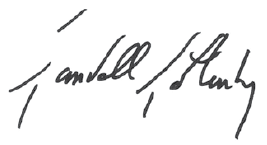
Randall Rothenberg
President and Chief Executive Officer
Interactive Advertising Bureau
2016 Financial Review
Investing in IAB Members’ Success and the Growth of the Industry
Providing value to our members is a top priority at IAB, and the financial state of IAB, like the members and industry we represent, started and ended the year strong. It is a reflection of the work we do on behalf of our members and the confidence they place in us.
According to unaudited 2016 financial statements and under the fiscal leadership of IAB Executive Vice President and COO, Patrick Dolan, IAB finished the year with topline revenue of $30.1 million, up from $28 million in 2015.
Membership dues revenue reached $15 million for 2016, a slight decline from 2015 due to increased M&A activity within the members of how important certifications and training are for developing a healthy talent pipeline in our industry. Overall, newly formed IAB organizations are also taking hold and delivering on revenue. The IAB Tech Lab brought in $2 million in its second year of operation to develop tools, standards, and best practices that simplify and reduce costs associated with the digital advertising and marketing supply chain. IAB also received $500,000 in donations to the IAB Education Foundation and its iDiverse initiative in 2016 for building a more diverse talent pipeline, and we are already getting recommitments for 2017 and beyond. industry. On the events side, IAB saw a slight and anticipated drop in income, projected to bring in $7.3 million—or a decline of 1.5 percent—from 2015, due primarily to fixed costs associated with events and overall saturation in the market.
As the digital media and advertising industry has grown, our members have asked for more training programs for growing the talent pool. The IAB Certification Programs and Professional Development, established four years ago, totaled $2 million in revenue, bringing the four-year total of certification participants to more than 10,000 professionals. The continued growth of the certification programs is a validation from our members of how important certifications and training are for developing a healthy talent pipeline in our industry.
Overall, newly formed IAB organizations are also taking hold and delivering on revenue. The IAB Tech Lab brought in $2 million in its second year of operation to develop tools, standards, and best practices that simplify and reduce costs associated with the digital advertising and marketing supply chain. IAB also received $500,000 in donations to the IAB Education Foundation and its iDiverse initiative in 2016 for building a more diverse talent pipeline, and we are already getting recommitments for 2017 and beyond.
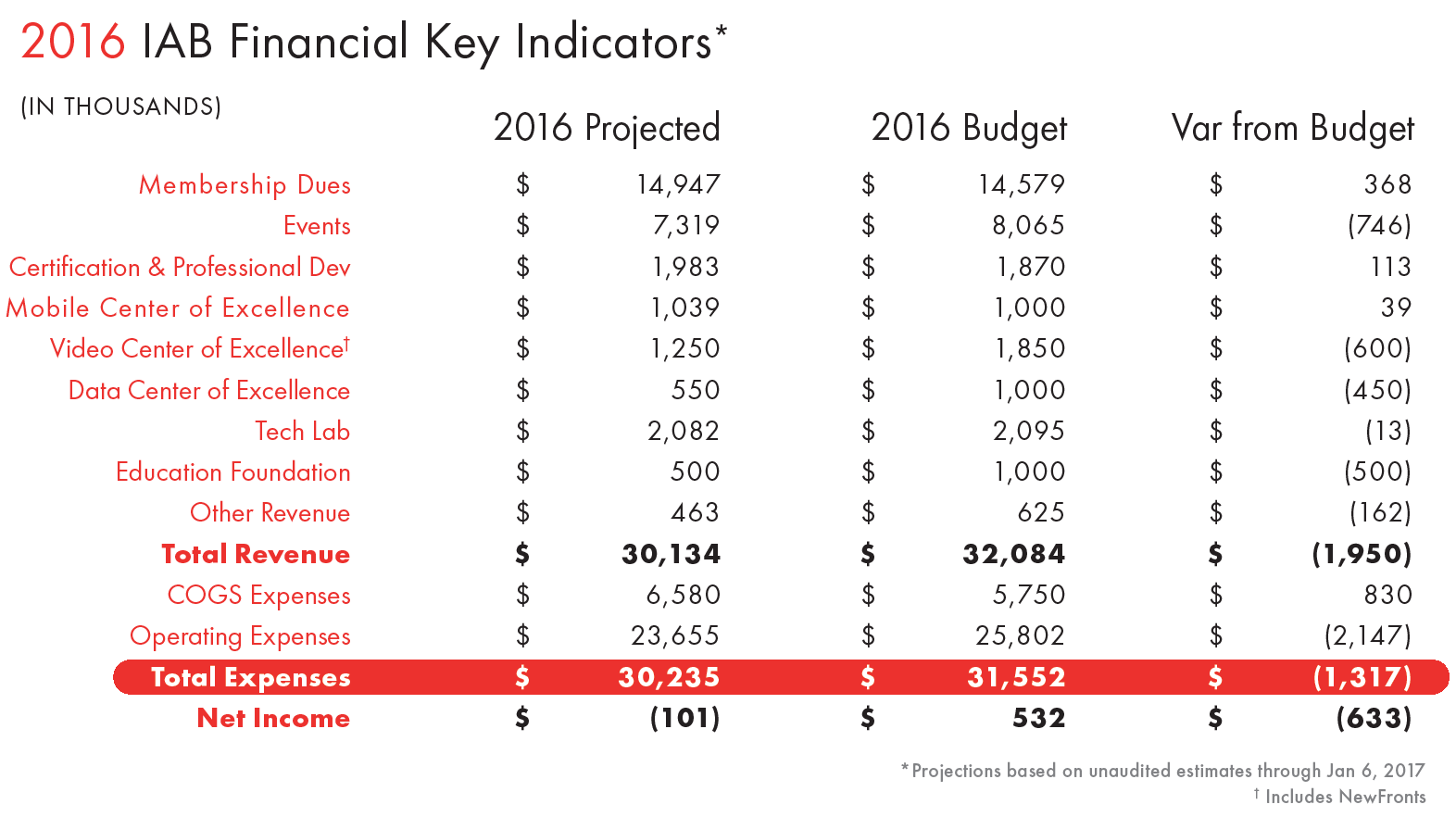
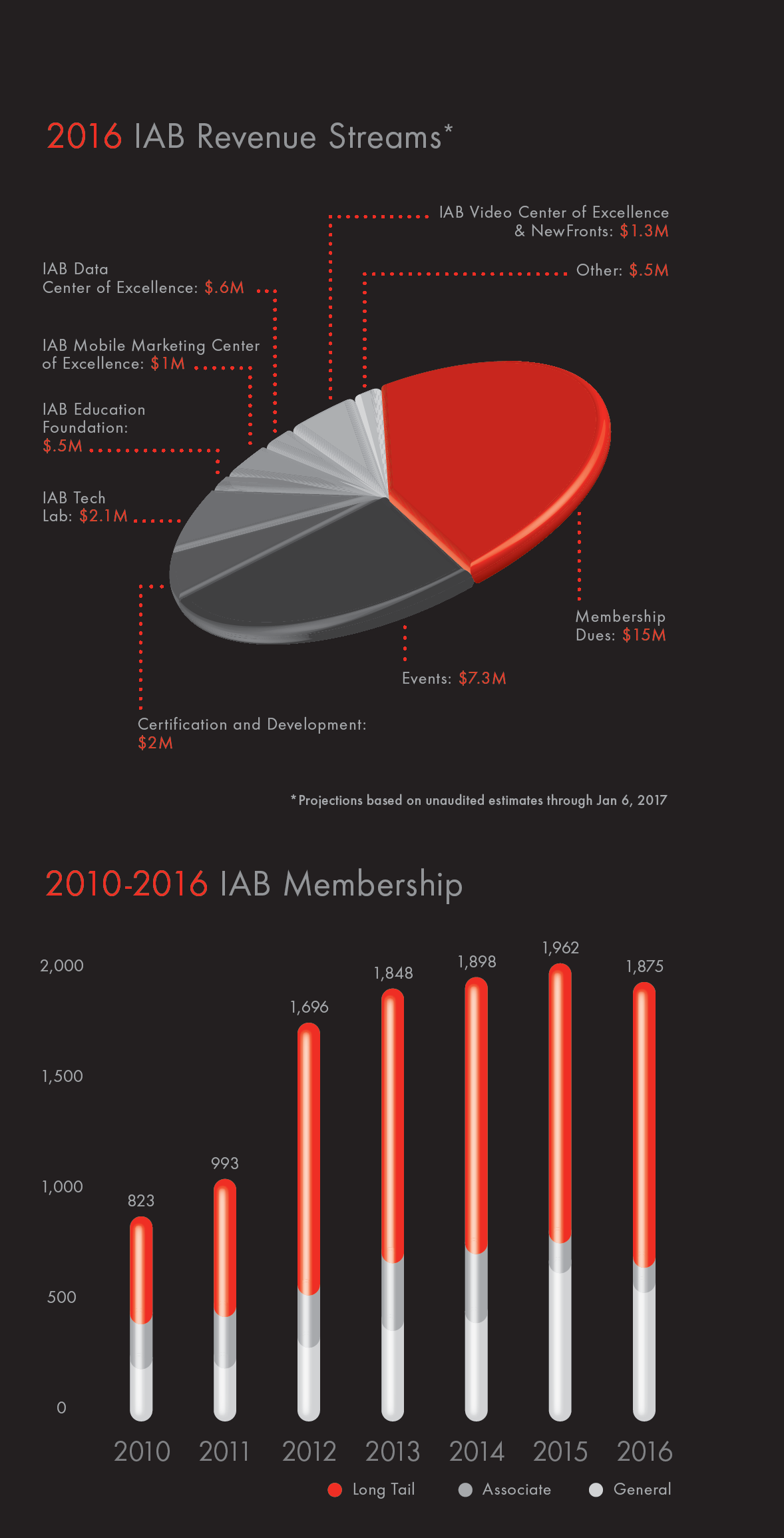 The Centers of Excellence are also showing solid progress, and are projected to see $2.8 million in revenue in 2016. The IAB Mobile Marketing Center of Excellence is projected to see $1 million in revenue in 2016, which is a positive sign for the relevance and success of our mobile efforts. The Video Center of Excellence saw revenue of $1.3 million including the increasingly popular NewFronts industry event, and the Data Center of Excellence saw revenue of $550,000.
The Centers of Excellence are also showing solid progress, and are projected to see $2.8 million in revenue in 2016. The IAB Mobile Marketing Center of Excellence is projected to see $1 million in revenue in 2016, which is a positive sign for the relevance and success of our mobile efforts. The Video Center of Excellence saw revenue of $1.3 million including the increasingly popular NewFronts industry event, and the Data Center of Excellence saw revenue of $550,000.
Additional ongoing revenue streams include initiatives such as sponsored research, member services, the spiders and bots list, international licensing fees, and other fundraising programs.
In 2016, IAB invested revenues received in helping member businesses excel. Funding was directed toward producing valuable third-party research for building brands in digital media as well as investing in the IAB Video Center of Excellence, the new IAB Data Center of Excellence, the IAB Education Foundation, and a new Buying and Planning Certification program. We also made additional investments in the IAB Tech Lab to support LEAN initiatives, Coalition for Better Ads, and a new San Francisco office, investments which we believe are foundations for the future growth of our members.
Finally, IAB and its organizations managed expenses closely in 2016, which totaled $30.2 million, and closed the year near break-even as projected, in spite of some unanticipated but essential investments such as participating in the Coalition for Better Ads and investing heavily in the IAB Tech Lab’s LEAN initiatives.
With our members’ support, IAB is well-positioned financially to deliver on an ambitious agenda for championing industry growth in 2017 and beyond.
IAB Tech Lab
Driving Technology Enablement and Growth
Technical standards are key to the healthy and sustained growth of an industry, and the IAB Tech Lab is the most important global center for the development of standards for the digital media and advertising industries. Under the leadership of Alanna Gombert, Senior Vice President, Technology & Ad Operations, IAB, and General Manager, IAB Tech Lab, the organization has advanced across a number of dimensions. Key initiatives from the Tech Lab in 2016 included the development of innovative and scalable technical standards, a code library and tools to assist in their rapid, cost-effective implementation, and test platforms for companies to evaluate the compatibility of their technology solutions with IAB standards, which for almost 20 years have been the foundation for interoperability and profitable growth in the digital advertising supply chain.
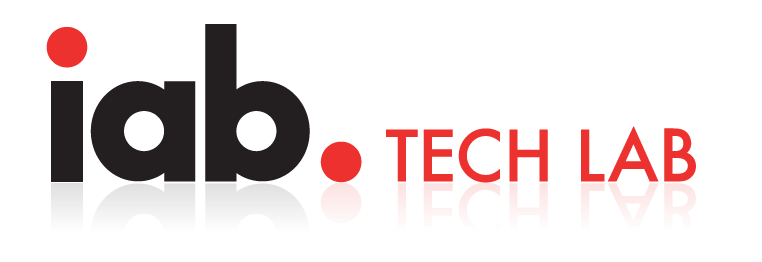
Improving User Experience
Good user experience is at the core of allowing the interactive ecosystem to thrive. In support of the initial LEAN Ads Principles (Lightweight, Encrypted, AdChoices supported, and Non-invasive advertising) released in 2015, additional research (both consumer and publisher), standards creation, and white paper guidance to the market was introduced to our members and their partners. IAB has been working to create a scoring system for publishers to use to optimize user experience, and for creative shops to adhere to for asset development.
IAB Tech Lab Board of Directors
Founding Chairman
David Moore , Xaxis
Founders
Anand Das , PubMatic
Alex Lord , Yahoo
Kelly Petersen , Tremor Video
Mike Romoff , LinkedIn
Tom Shields , AppNexus
Michael Smith , Hearst Magazines Digital Media
Scott Spencer , Google
Toru Takata , Yahoo Japan
Board Members
David Adams , Condé Nast
Krishan Bhatia , NBCUniversal
Neil Bowman , BBC Worldwide Americas
J. Allen Dove , SpotX
Campbell Foster , Adobe
Marc Frons , News Corporation
Kevin Heery , Time Inc.
David Jakubowski , Facebook
Tom Kershaw , Rubicon Project
Tian Lim , Hulu
John Montgomery , GroupM
Janneke Niessen , Improve Digital
Robyn Petersen , Mashable
Zach Putnam , ABC Television
Jason Richman , Spotify
Willard Simmons ,DataXu
Peter Sirota , Quantcast
John Vandermay , Collective
Joe Zawadzki , MediaMath
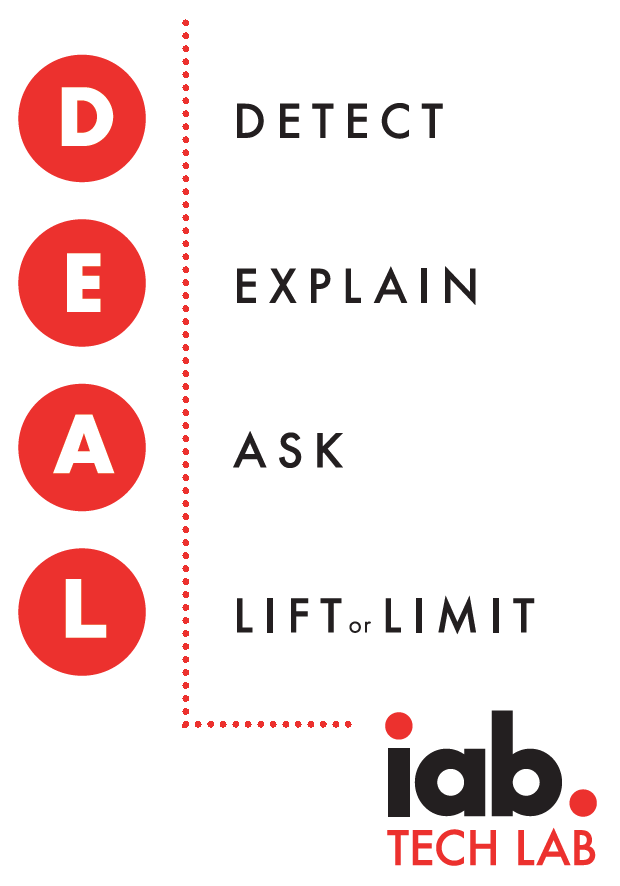 Building on the progress to help publishers and advertisers understand the dynamics of user ad blocking, the IAB Tech Lab released an Ad Blocking Primer in March 2016 that outlines the range of communications and response tactics available to publishers to connect with visitors who have downloaded ad blocking software. In addition, the Tech Lab also released a detection script to consistently and reliably determine whether ad blocking is happening during a page load.
Building on the progress to help publishers and advertisers understand the dynamics of user ad blocking, the IAB Tech Lab released an Ad Blocking Primer in March 2016 that outlines the range of communications and response tactics available to publishers to connect with visitors who have downloaded ad blocking software. In addition, the Tech Lab also released a detection script to consistently and reliably determine whether ad blocking is happening during a page load.
To further support our publisher members, IAB held an invitation-only Ad Blocking and User Experience Summit in June 2016 in New York. Leading publishers and top advertisers shared successful strategies for improving user experience to stem the tide of ad blocking. Senior executives from across the ecosystem delved into real-world publisher case studies, and the latest actionable tools that can help the entire industry create better, LEANer user experiences were discussed.
The release of the new IAB Standard Ad Unit Portfolio for public comment in September 2016 aimed to fundamentally change the conversation about ad units in a way that accounts for the amazingly dynamic nature of the user’s experience on the increasingly mobile-everything world. The portfolio incorporates the LEAN principles within all of its display, mobile, video, and native ad formats. LEAN specs are based on HTML5 technology and informed by industry surveys, user research, and testing. The new ad units are expected to debut in 2017.
IAB Tech Lab has also been participating in the Coalition for Better Ads, a workforce of leading international trade associations and companies involved in online media to improve consumers’ experience with advertising. The group is already building the technology for the coalition which will be released in the coming months.
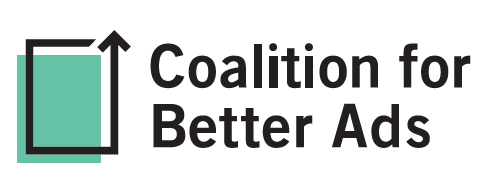 The Tech Lab also released version 3.0 of the Mobile Rich Media Ad Interface Definition (MRAID) for public comment. The revised MRAID provides technical guidance for improved user experience of rich media ads running in mobile apps, faster ad rendering, audibility and viewability measurement, and Video PlayerAd Interface Definition (VPAID) integration, among other advancements that are also more developer-friendly. In addition to providing guidance on pre-loading ads and understanding ad readiness to display an ad to the user, MRAID 3.0 also introduces location data.
The Tech Lab also released version 3.0 of the Mobile Rich Media Ad Interface Definition (MRAID) for public comment. The revised MRAID provides technical guidance for improved user experience of rich media ads running in mobile apps, faster ad rendering, audibility and viewability measurement, and Video PlayerAd Interface Definition (VPAID) integration, among other advancements that are also more developer-friendly. In addition to providing guidance on pre-loading ads and understanding ad readiness to display an ad to the user, MRAID 3.0 also introduces location data.
Guidelines and Standards for Measurement
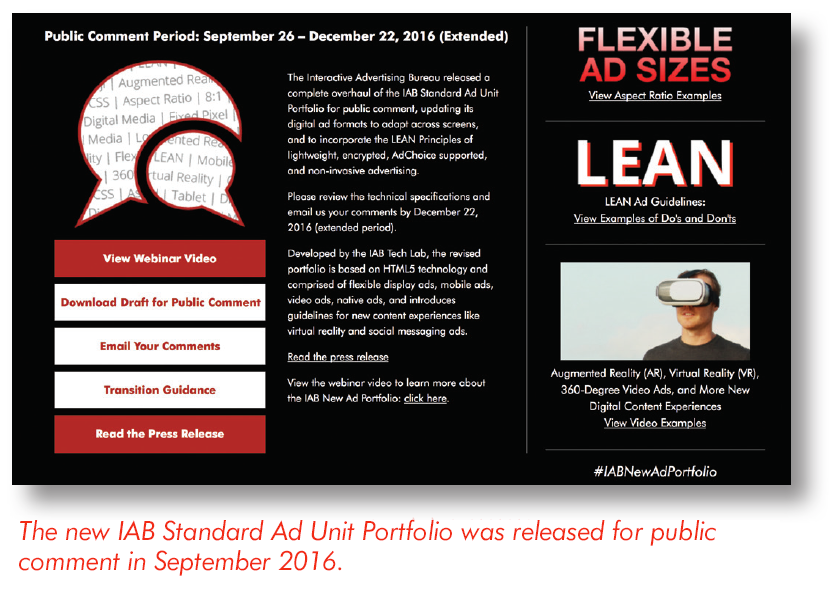 In response to the marketplace growth and appetite for podcasting, the Podcast Ad Metrics Guidelines, released in September 2016, bring Tech Lab expertise to an emerging field faced with a significant need for consistent measurement conventions. The guidelines break down the technical details of content and ad delivery and then define the commonly used metrics, with some examples on how to measure those metrics.
In response to the marketplace growth and appetite for podcasting, the Podcast Ad Metrics Guidelines, released in September 2016, bring Tech Lab expertise to an emerging field faced with a significant need for consistent measurement conventions. The guidelines break down the technical details of content and ad delivery and then define the commonly used metrics, with some examples on how to measure those metrics.
The Header Tag Task Force developed a Header Container Manager Outline which provides the framework for header tag standards development. This was presented to the Tech Lab Board of Directors which approved the development of a protocol which will detail how header managers should work with the Ad Server.
Additionally, IAB OpenDirect 1.5.1, an update to the protocol for the automated guaranteed method of buying programmatic ads, was released in September 2016. And OpenRTB 2.5 was released for public comment in November 2016, which includes updates that integrate current trends and allows for improvements in programmatic technology.
The Dynamic Content Ad Standard, a structured system of metadata for defining creative components and their asset variations in an ad unit, was also released in October 2016. This standard is designed to help creative developers, ad content management systems, and ad servers build and serve real-time dynamic content in advertisements.
Industry Access to Essential Testing Tools
Continuing the IAB commitment to making viewability detection easier, the OpenVV code has been updated to handle HTML5 Intersection Observer functionality. The Tech Lab also developed the Mobile Rich Media Ad Interface Definitions (MRAID) Ads Software Development Kit (SDK) Tester to provide a way to test and validate ads on a mobile device against multiple SDKs in minutes.
IAB Tech Lab has created a platform for SaaS access to certain tools and utilities, like the HTML5 Ad Validator. This centralized offering lowers the technology know-how threshold for members to use tools, and provides a trusted version. The platform has been updated to support OAuth 2.0 specs, with a front-end JavaScript framework for authentication and authorization.
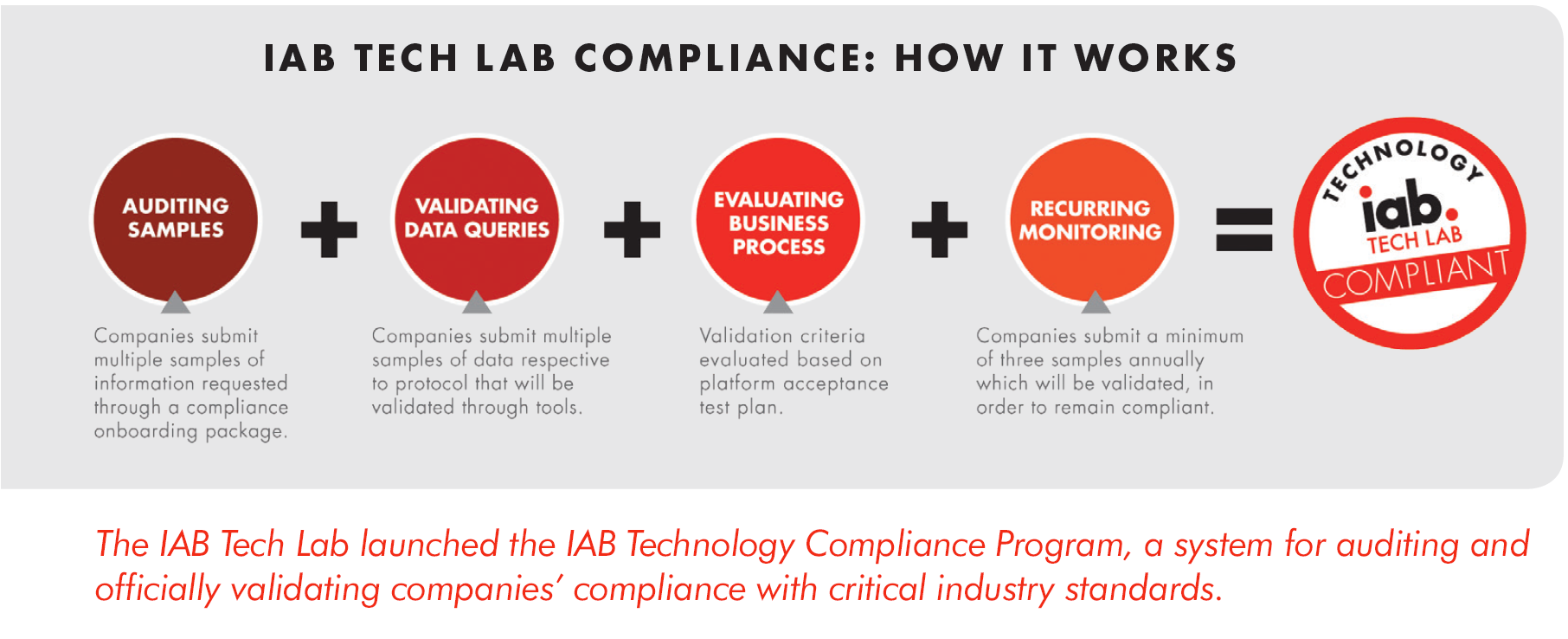
This technology platform appears alongside the newly released IABTechLab.com website, which streamlines access to specifications, tools, and compliance programs offered by IAB Tech Lab, and includes a blog which features writing from staff and industry subject matter experts.
Streamlining Standards Compliance
IAB Tech Lab completed a corporate pilot of VAST/VPAID compliance testing. Corporate compliance verifies member implementations of IAB technologies in the important mission of making industry interoperation of technology more efficient. IAB Tech Lab has built out the VAST 4.0 Validator, updated the HTML5 Validator, and created an OpenRTB Bid Validator in order to support the compliance program.
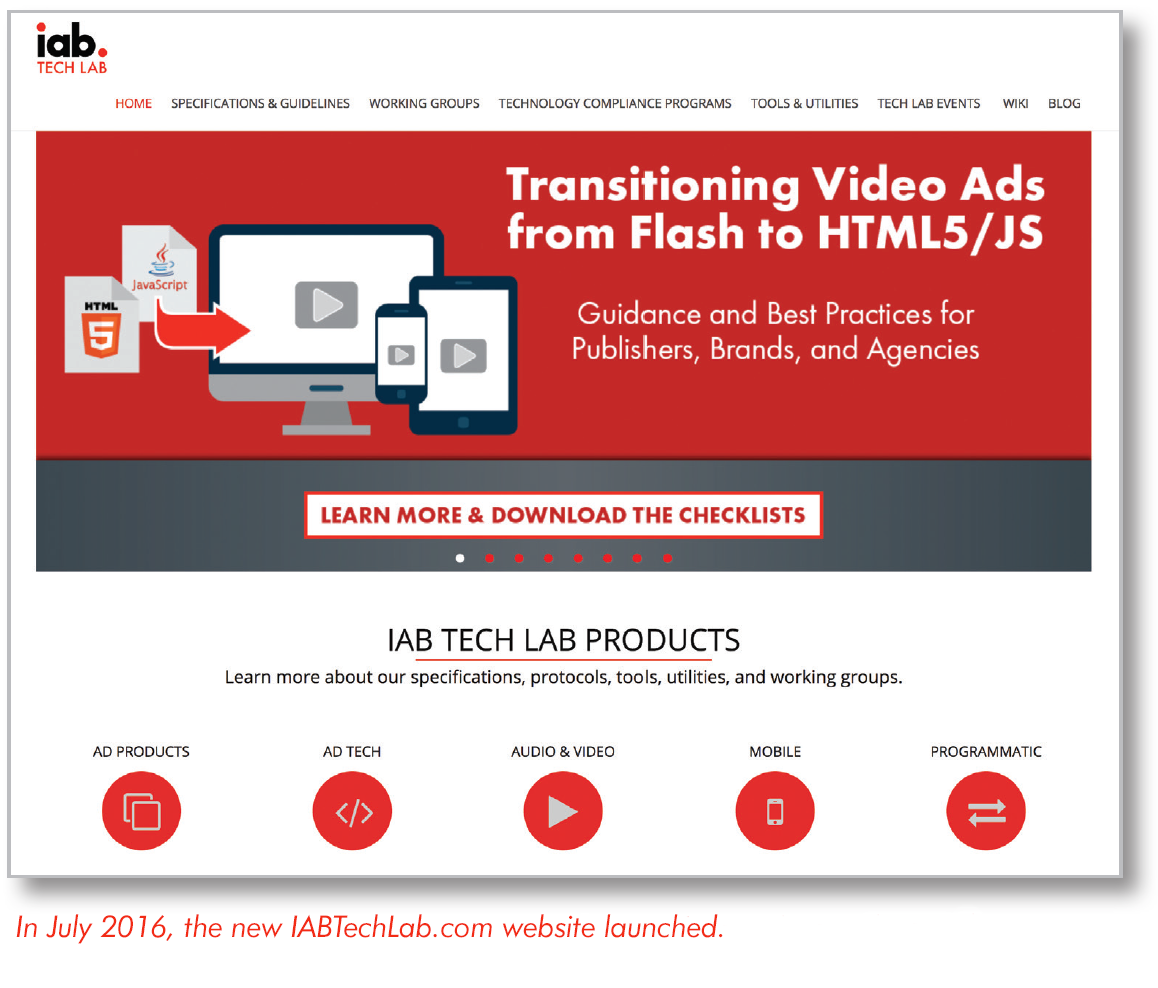
In December 2016, the IAB Tech Lab released “Transitioning Video Ads from Flash to HTML5/JS,” practical guidance for migrating digital video advertisements to HTML5 and JavaScript, technologies which have emerged as the default media playback options in the majority of today’s browsers. As a complement to this transition paper, the IAB Tech Lab also provided two detailed checklists to ease the transition for different stakeholders, which include communications best practices and information regarding the technical components that need to be updated.
The Tech Lab also created a cross-industry convergence group with cable and broadcast engineering trade associations including the Society of Cable Telecommunications Engineers (SCTE), the 4As, the ANA, and the North American Broadcasters Association (NABA). The ultimate goal is to ensure digital video files work with commercial broadcast rules from production to delivery, which is essential as video ads are delivered over connected devices.
Digital Advertising Alliance
IAB Tech Lab supported the Digital Advertising Alliance (DAA) in their achievements of bringing opt-out to mobile with the AppChoices program and in ongoing campaigns to educate consumers about YourAdChoices and the AdChoices Icon. The Tech Lab also provided support for the DAA’s digital operations, which will culminate in an updated website in early 2017.
Increasing Transparency and Accountability
In the ongoing effort to increase transparency and to combat criminal activity across the digital advertising ecosystem, IAB Tech Lab has assisted the Trustworthy Accountability Group (TAG) in achieving a number of significant milestones. TAG Registered companies have been verified as legitimate participants in the digital advertising industry through a proprietary background check and review process powered by Dun & Bradstreet and approved by TAG. Once registered, companies are awarded a TAG ID, a unique global identifier they can share with partners and append to their ads or the ad inventory they sell. IAB Tech Lab leads the effort to define requirements and implementation characteristics of the TAG ID protocol, as well as establishing the API interface for accessing a directory of TAG IDs. IAB Tech Lab has also built the foundation of the next version of the registration portal, leveraging D&B’s APIs to streamline the application process through automated checking of applicant credentials.
IAB Tech Lab has also been instrumental in designing and helping implement the Payment ID protocol, which works together with the TAG Registry to enable companies across the advertising supply chain to verify payment information and protect against fraud.
Companies participating in TAG’s Certified Against Fraud program have met a range of qualifications, including completion of the TAG Registration process. Additionally, direct sellers, fraud vendors, and intermediaries provide raw data for TAG’s anti-fraud tools: the domain threat list and data center IP list. IAB Tech Lab is responsible for developing, deploying, and improving these tools alongside the Anti-Fraud Working Group, as well as for providing design leadership for distributing realtime, at-scale information on potential threats throughout the supply chain.
IAB Tech Lab has assisted TAG’s anti-malware efforts by facilitating the organization’s Anti-Malware Working Group, as well as participating in the design of the Malware Sharing Hub to disseminate near real-time intelligence on malware attacks to other companies and law enforcement agencies.
![]()
Public Policy
Advocating to Legislators and Policymakers
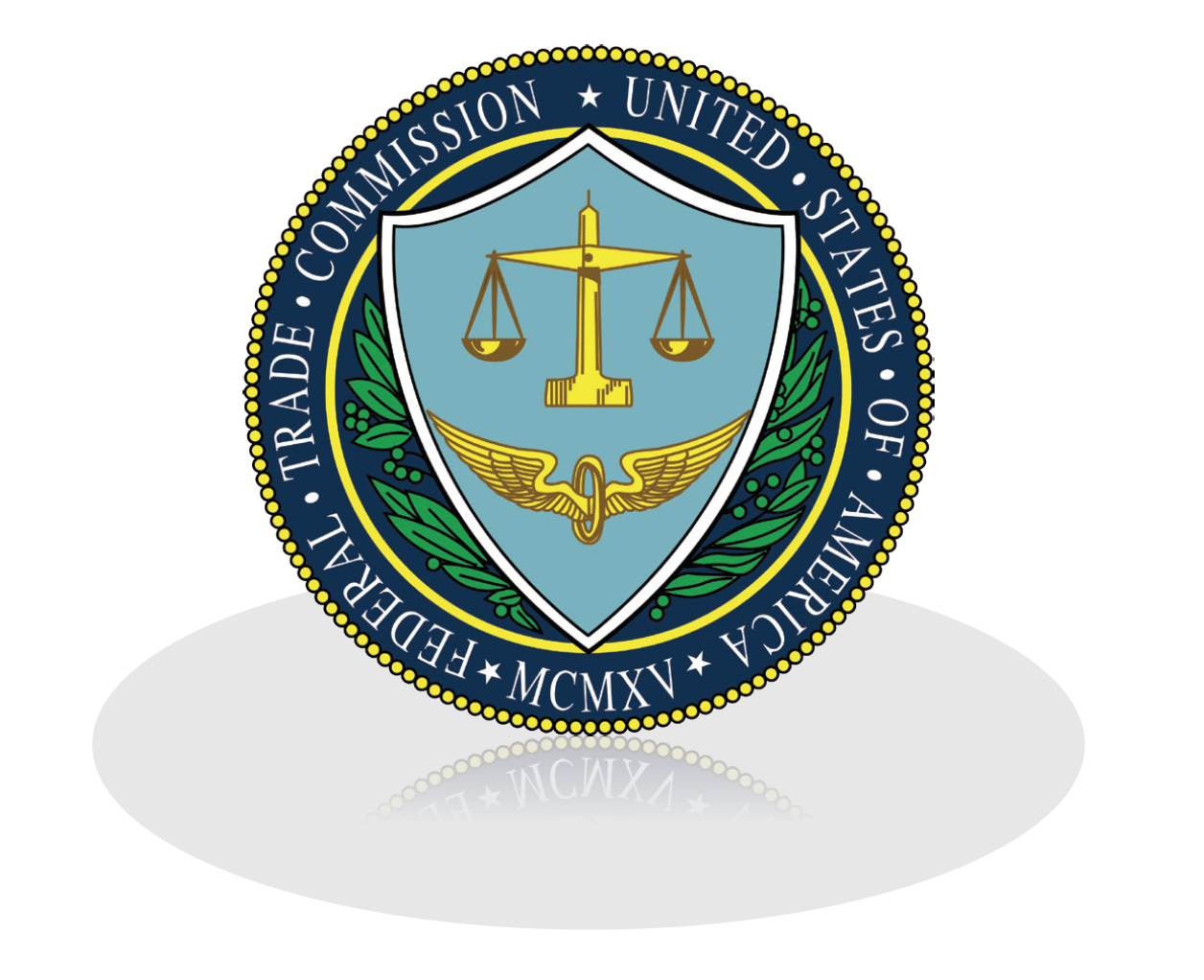 The IAB public policy office in Washington, D.C. continues to be a strong force for policy and advocacy on behalf of our members at the federal and state level. With the changing administration in 2017, it’s more important than ever that IAB is the voice of reason to educate industry and regulators and push through major initiatives in support of consumer privacy, data security, supply chain safety, advertising taxation, and other major regulatory and legislative issues. In January 2016, IAB appointed Dave Grimaldi as the new Executive Vice President, Public Policy to lead its Washington, D.C. office. Under his leadership, IAB continued to push forward on advocacy efforts to ensure that IAB members’ voices are represented before Congress, as well as at key agencies including the Federal Trade Commission (FTC) and the Federal Communications Commission (FCC).
The IAB public policy office in Washington, D.C. continues to be a strong force for policy and advocacy on behalf of our members at the federal and state level. With the changing administration in 2017, it’s more important than ever that IAB is the voice of reason to educate industry and regulators and push through major initiatives in support of consumer privacy, data security, supply chain safety, advertising taxation, and other major regulatory and legislative issues. In January 2016, IAB appointed Dave Grimaldi as the new Executive Vice President, Public Policy to lead its Washington, D.C. office. Under his leadership, IAB continued to push forward on advocacy efforts to ensure that IAB members’ voices are represented before Congress, as well as at key agencies including the Federal Trade Commission (FTC) and the Federal Communications Commission (FCC).
Washington, D.C.
Native Advertising Guidance
Slightly more than two years after holding its first workshop on native advertising, the FTC issued guidance on the topic. Though generally positive, IAB expressed significant concern about the specificity of native advertising guidance in some areas, including a section on language to denote native advertising in disclosures. Responding immediately, IAB scheduled a joint meeting of the Public Policy Council, Legal Affairs Council, and Native Advertising Task Force to evaluate the impact of the guidance and discuss next steps. During the course of the year, those next steps included a conversation with members and the FTC in the IAB New York office, and a webinar on the differences and interplay between the FTC’s native advertising guidelines and endorsement guidance.
A Voice in FCC Privacy Proceedings
IAB has become a leading voice at the FCC, particularly regarding the Commission’s Notice of Proposed Rulemaking on Broadband Consumer Privacy. In both meetings with the Commission and filings made on the proceeding, IAB explained the benefits of self-regulation in the digital advertising space.
Media Institute Communications Forum
In September 2016, Randall Rothenberg provided keynote remarks at the Media Institute’s Communications Forum in Washington, D.C. Before a full room of senior representatives from the FCC, Congress, political press, and industry, his remarks addressed the growth of digital advertising, IAB involvement in the key policy debates of today, and how our industry must collectively address the threat of ad-block profiteers.
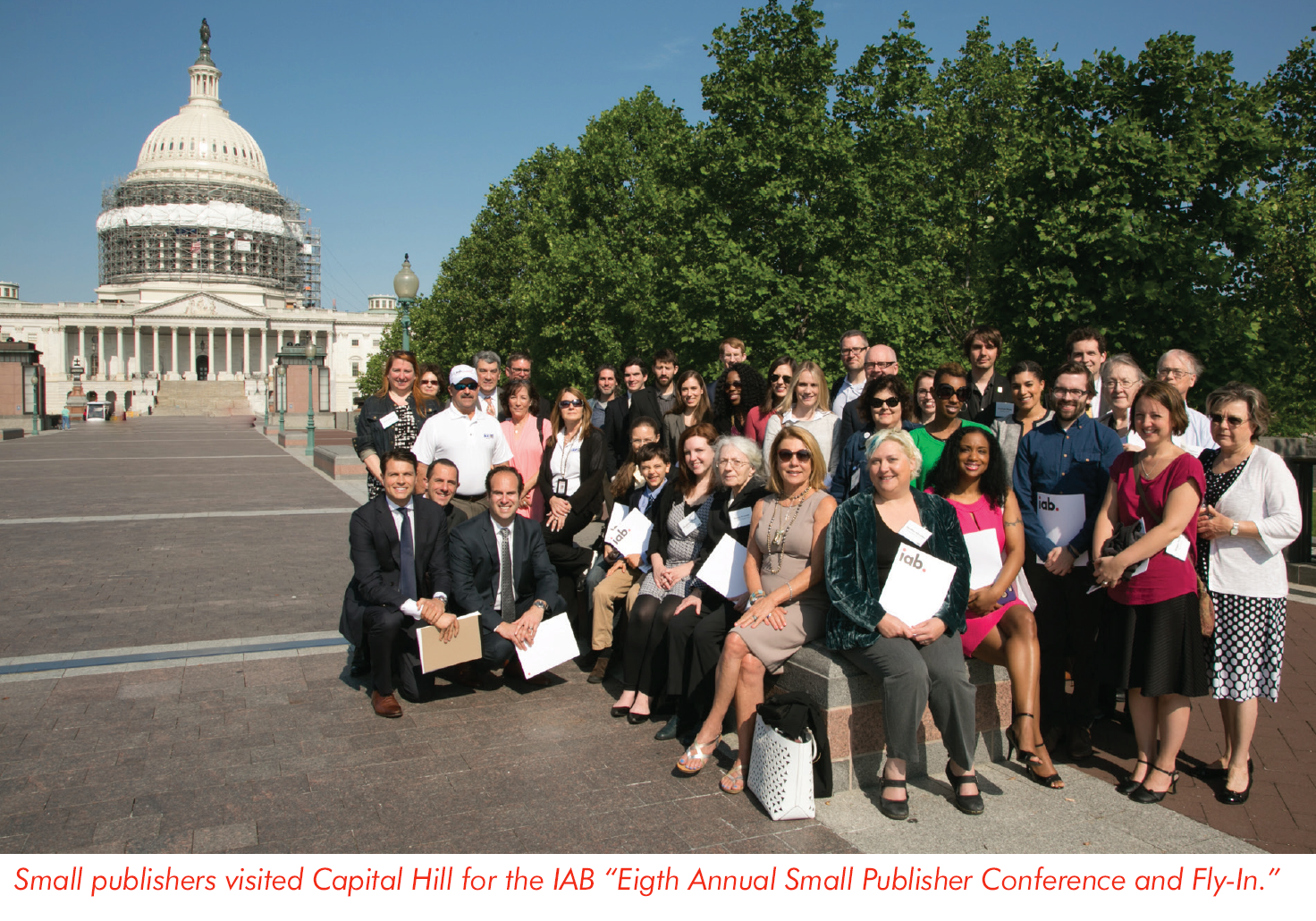
Small Publisher Fly-In
Every year since 2009, IAB has brought small online publishers to the nation’s capital. This year, attendees spent the first day immersing themselves in the hottest topics in digital: content syndication, omnichannel marketing, video, ad blocking, native, local, and more, as well as networking with their fellow small publishers. Day two was spent meeting with Congress, sharing their experience as small business owners, and providing an understanding the impact that legislation and regulations may have on their businesses and livelihoods.
Beyond the Beltway
The IAB Public Policy Office continues to expand its national and international agenda as more of the policies affecting the future of the internet and the digital advertising industry originate in state legislative bodies and in foreign and intergovernmental agencies.
Expanding the International Agenda
Digital is not bounded by borders, and there continue to be a number of regulatory priorities at the international level.
The IAB Public Policy Office has coordinated a global policy strategy with international counterparts to more effectively advocate for the digital advertising industry before foreign governmental agencies. IAB is a strong advocate for legislation essential to facilitating approval of the Privacy Shield, the replacement agreement for Safe Harbor.
Bringing Washington to the Digital Content NewFronts
In May 2016, the IAB Public Policy team had a historic first, bringing a handful of senior staff from the House Energy and Commerce Committee to New York for a day and night at the Digital Content NewFronts. With the extreme restrictions put on these kinds of trips by Congressional ethics laws, outings of this nature are extremely rare, amplifying the incredible value they offer. During the course of the day, staff members had the opportunity to see the power and growth of digital video, hear how traditional publishers have evolved into more diverse media companies, and learn more about the ad technology space. The trip provided an opportunity for IAB to deepen its Congressional relations, put an industry face on the often academic nature of policy discussions in Washington, and reinforce the IAB brand as a serious player in the nation’s capital.
Advocating for Smart Consumer Protection Policies
On October 17, 2016, IAB hosted Congressman Joe Kennedy (MA-4), in the IAB Ad Lab in New York. A rising star in Washington, and member of the Energy and Commerce Committee since 2015, this was an opportunity for the Congressman to hear from IAB members about the pressing topics for our industry, including online privacy, data security, and tax deductibility.
Education
Promoting Education and Development for the Digital Ecosystem
As the digital media and advertising industry has grown, IAB members have asked for more training programs to grow the talent pool by improving skills in the digital media and advertising industries, and by expanding certification programs in sales, data solutions, and ad operations. The IAB Certification Program continues to grow in size and global recognition. In 2016, more than 2,500 new digital leaders have taken part in the Sales, Ad Operations, and Data programs across 41 countries, bringing the total number of participants to more than 10,000.
In September 2016, IAB Certification launched its newest program: IAB Digital Media Buying and Planning Certification. The credential is designed specifically for media agencies and digital strategists, a new market segment for IAB. IAB partnered with the 4A’s in marketing the program. Additionally, Google committed to the Certification sponsoring a portion of the program development and underwriting a large group of its own agency reps to take the exam and training across the next twelve months.
![]()
Demystifying the Programmatic Ad Stack
As the industry has grown, programmatic has become more and more important for scale. As a result the demand for education has increased, and in response, IAB has built out a more robust program and rolled it out to many cities including Boston, Chicago, Los Angeles, New York City, San Francisco, and Washington, D.C. The course focuses on developing an advanced understanding of the programmatic media ecosystem, including an in-depth working knowledge of the key technologies that make up today’s programmatic ad stack across display, mobile, video, social media, email marketing, and native advertising.
The ongoing demand from members for IAB Learning and Certification programs is a validation of how important training is for the industry as a whole to extend the talent pipeline.
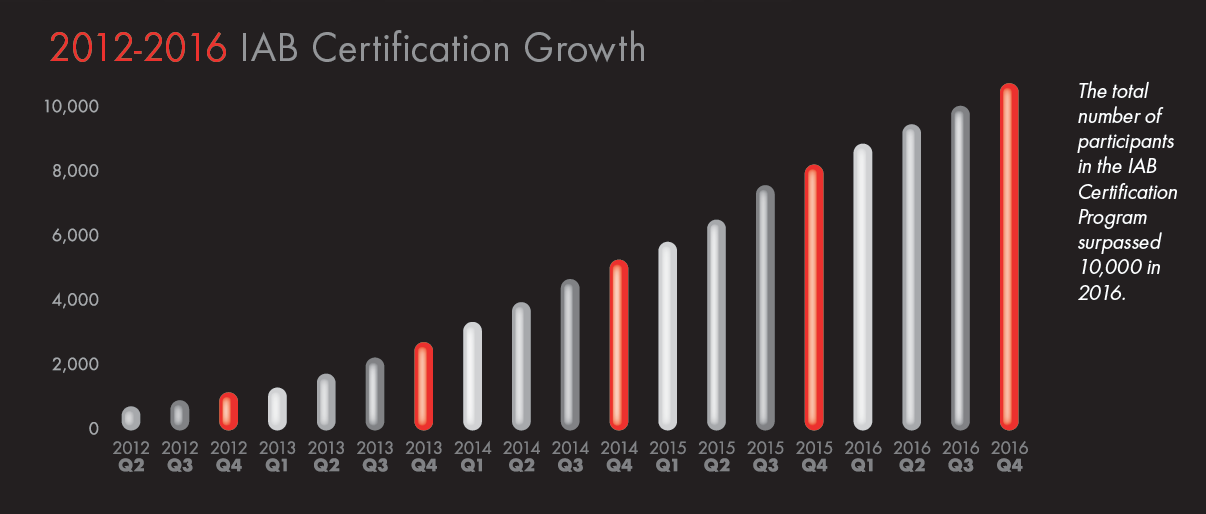
Encouraging Diversity in the Workforce of the Future
A healthy and sustainable digital industry needs a talent pipeline that reflects the audiences it serves. IAB has taken important steps toward this goal by launching the IAB Education Foundation, and in 2016, IAB was delighted to welcome Microsoft, Facebook, and MediaLink to the Board of Directors, who now join AOL as founding members. The Foundation is dedicated to championing efforts to increase racial, ethnic, gender, and economic diversity in the digital industry.
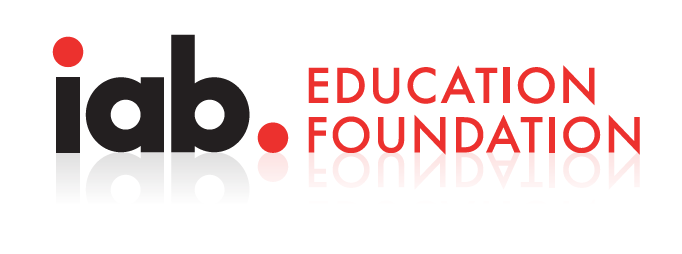
Training the Workforce of the Future
This August 2016, the IAB Education Foundation’s inaugural cohort of the Digital Advertising Program began classes at the College of San Mateo. The Foundation also announced a partnership with the Borough of Manhattan Community College to bring the Digital Advertising Program to the East Coast in 2017. Similar to the West Coast program, this four-month intensive training includes a Digital Advertising Certification and prepares diverse constituents for full-time employment in Ad Ops, Sales Support, Data Analytics, and Marketing. Students enrolled in the West Coast program graduated in December 2016 and will be interviewing for entry-level jobs in early 2017.
Diversity and the Talent Pool
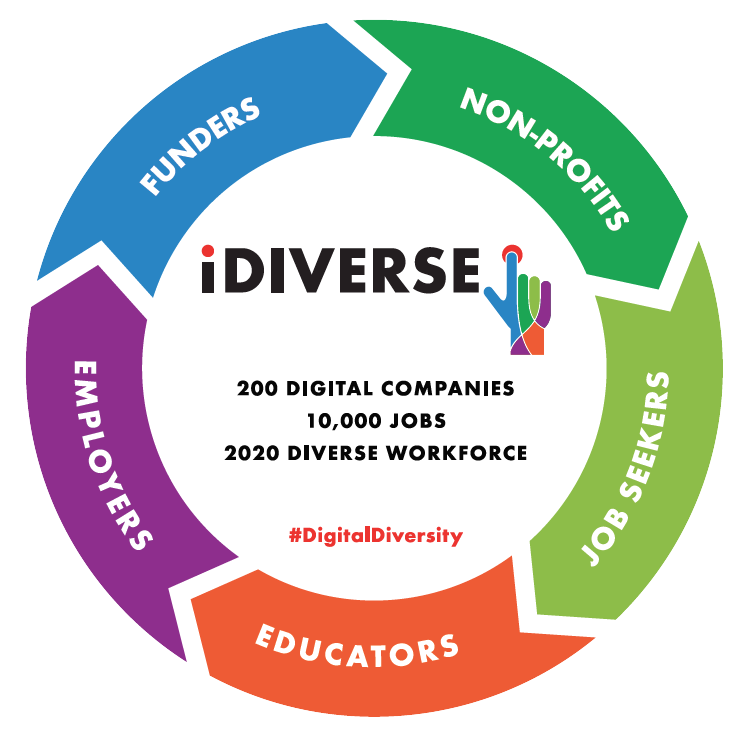 iDiverse, the diversity and inclusion initiative of the IAB Education Foundation, announced a goal of its own in 2016— 200 digital companies, 10,000 jobs, 2020 workforce target. IAB is committed to creating a pipeline of diverse and skilled workers to ensure the continued health and vibrancy of the digital industry.
iDiverse, the diversity and inclusion initiative of the IAB Education Foundation, announced a goal of its own in 2016— 200 digital companies, 10,000 jobs, 2020 workforce target. IAB is committed to creating a pipeline of diverse and skilled workers to ensure the continued health and vibrancy of the digital industry.
Additionally, the Foundation launched the iDiverse Non-Profit Directory in August 2016. The Directory serves as the intermediary between non-profits and those in the industry looking to mentor, train, volunteer, and help build a diverse talent pool for the digital industry through engagement with the local community.
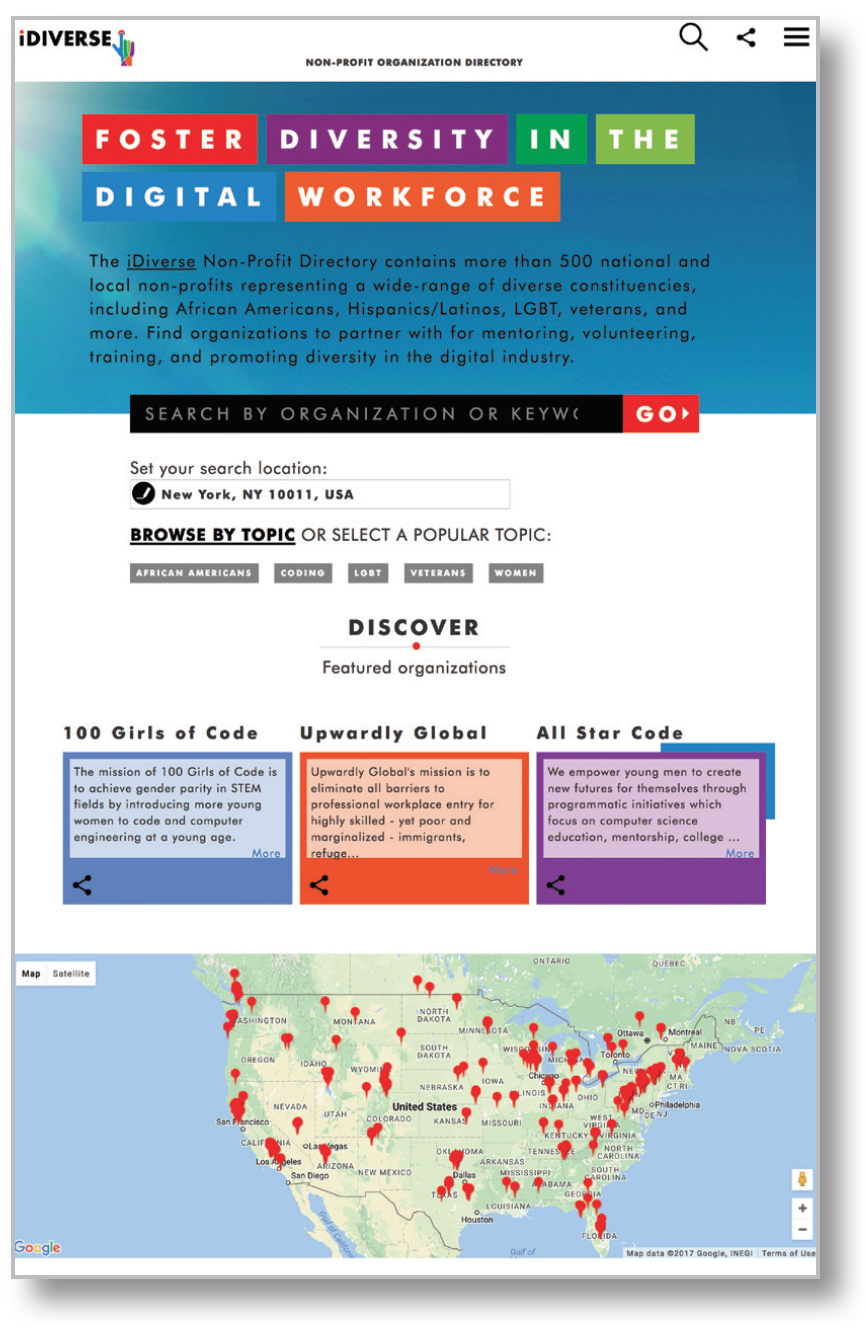
Demystifying the Programmatic Ad Stack
As the industry has grown, programmatic has become more and more important for scale. As a result the demand for education has increased, and in response, IAB has built out a more robust program and rolled it out to many cities including Boston, Chicago, Los Angeles, New York City, San Francisco, and Washington, D.C. The course focuses on developing an advanced understanding of the programmatic media ecosystem, including an in-depth working knowledge of the key technologies that make up today’s programmatic ad stack across display, mobile, video, social media, email marketing, and native advertising.
Digital Video
Spurring Innovation and Standards in Digital Video
According to the 2015 Full-Year IAB Internet Advertising Revenue Report, digital video (non-mobile) reached $4.2 billion in 2015 (a 30 percent rise over 2014) and mobile video ads are also poised for rapid growth over the next five years. To further that advancement, the IAB Digital Video Marketing Center of Excellence has pushed forward the mission to grow, streamline, and improve the buying and selling of video advertising.
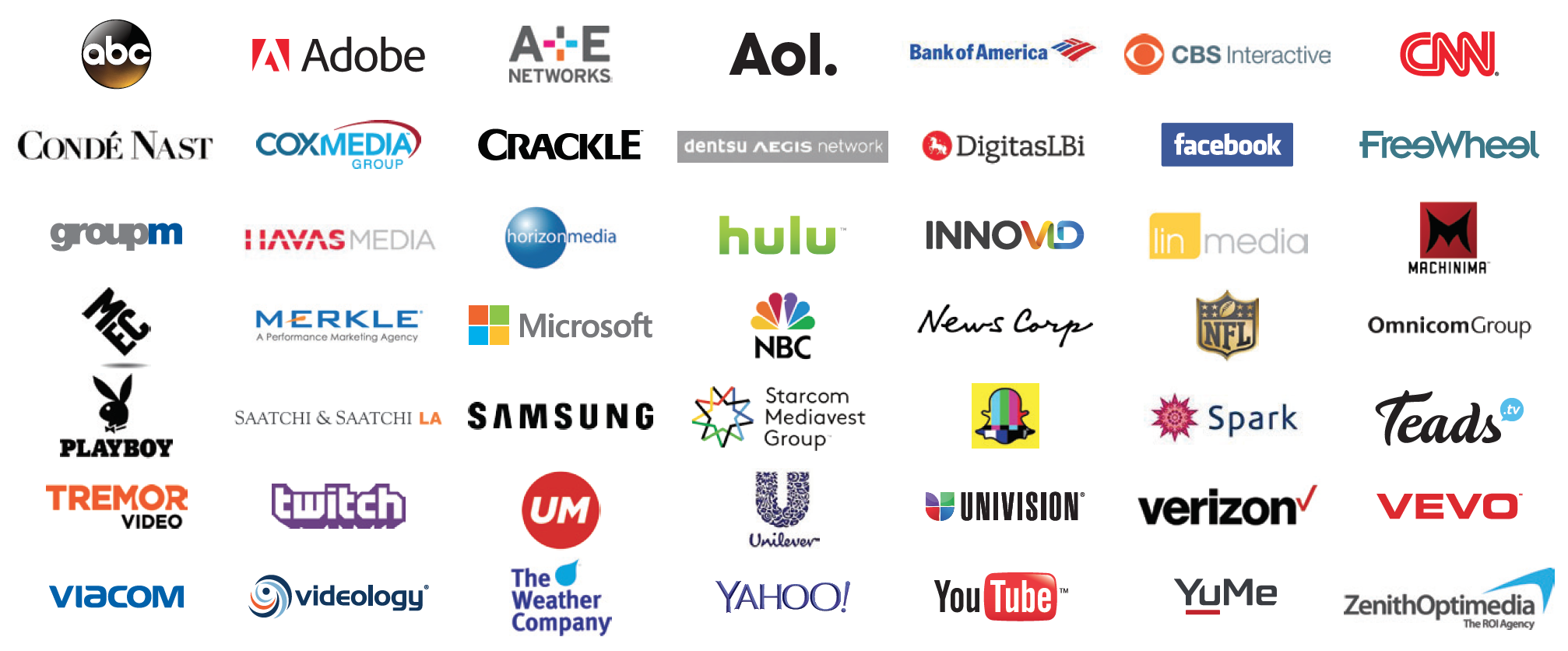
Digital Video Center of Excellence 2016 Board Membership
Digital Content NewFronts
The Digital Content NewFronts kicked off in May 2016 with IAB serving as the managing partner for the fourth year in a row. Interest this year was unprecedented, with 37 publisher-presenters (nine of which were new to the NewFronts), and many standing-room only events.
In conjunction with the NewFronts, IAB released “Digital Content NewFronts: Video Ad Spend Study 2016” highlighting a third year of increased budget allocations and a 114 percent increase in ad spending on original digital video programming since 2014. The study reinforces the critical role the event has played in media-buying decisions. Eight out of 10 respondents said their attendance at the 2015 NewFronts resulted in increased spending on original digital video content in the 12 months that followed, with TV-first buyers more likely to commit more dollars up front, and digital-first buyers to spend more throughout the year.

Video Leadership Summit – TELE://VISION
As television transitions from a broadcast news and entertainment medium distributed over public airwaves and cable systems to a widely distributed IP-based communications medium, IAB convened global leaders from blue chip advertising and technology companies at the inaugural Video Leadership Summit – Tele://Vision. The intimate event explored the economic, cultural, social, and political implications of television’s evolution and participants created an agenda for guiding the industry forward. Key next steps—including cross-platform sales training and building upon video measurement capabilities—are already underway for 2017.
2016 Original Digital Video Study
In May 2016, IAB released the “2016 Original Digital Video Study” with the goal of highlighting original digital video viewing behaviors for people age 18 and older, compared with their other online video and regular TV consumption. The comprehensive survey of over 1,900 consumers, produced by GfK, revealed that the audience consuming original digital video programming at least once a month grew steadily—from 45 million people in 2013 to approximately 63 million in early 2016—and represented a nine percent increase in median household income year-over-year. In a clear sign of growing value for advertisers, the study revealed that 38 percent of the original digital video audience found advertising on this format to be more memorable, versus 29 percent from just a year earlier. The 18- to 34-year-old cord-cutters, and “cord-nevers,” were even more likely to remember ads shown alongside original digital video content (48 percent today versus 27 percent a year ago).
Recognizing that many IAB members are increasing their participation and investment in the fast-moving VR and AR space, the IAB Mobile Marketing and Digital Video Centers of Excellence published a report in September 2016 titled, “Is Virtual the New Reality?” The report offers observations and opinions from a distinguished panel of over two dozen industry-leading voices in publishing, advertising, VR software, and developer platforms, analyzing virtual reality’s potential as an advertising and publishing medium, and identifying key strengths and challenges. Increased development of 360-degree video was singled out as a likely first step in virtual reality’s growth into a mainstream marketing channel. With VR being such a new platform, advertising capabilities are just now beginning to emerge. As members increasingly engage with VR, IAB is committed to playing the appropriate role in the medium’s evolution as an advertising platform.
Video Landscape Report
As part of its continued effort to educate the advertising marketplace, in October 2016 the IAB Video Center of Excellence released its “Video Landscape Report.” This report distills current industry trends and helps to educate the advertising marketplace about the growth and value of video in reaching and engaging consumers. A compilation of rich industry research and analysis, the report contents were informed by interviews and feedback from more than a dozen industry practitioners and subject matter experts including broadcast, cable, ad tech, digital pure plays, agencies, and brands, as well as multiple stakeholders from the IAB Video Board and Video Buyer’s Advisory Board. Updates to the landscape report will take place every six months.
Digital Video Glossary
The Digital Video Center also convened members of the Digital Video and Advanced TV committees in a new working group to create a digital video glossary. The group identified key video terms that require consistent, consensus definitions to help buyers and sellers understand the ever-changing video marketplace. The terms curated and defined by the working group were published as a new IAB document. The working group will reconvene regularly to refresh the glossary and make sure it stays relevant as the industry continues to evolve.
Understanding Automation in Programmatic Video
Despite the official IAB definition of programmatic as “the automated buying and selling of inventory,” confusion remains, especially in relation to video in the advertising marketplace. IAB’s Digital Video Board saw this confusion as an opportunity to shed light on the programmatic video space for both media buyers and sellers through the development of a white paper, representing a wide range of viewpoints and perspectives across the video ecosystem. Given the growth of programmatic video—which eMarketer estimates made up more than half of all U.S.-based digital video revenue in 2016—the stakes are high. The goals of the paper are to foster an understanding of programmatic video, to help the buy side and sell side have more meaningful conversations, and, as a result, to better enable the market to collectively leverage the emerging technologies, scale, and efficiencies that programmatic video can bring to bear for our members.
Mobile
Accelerating the Growth of Mobile
The consumer march toward mobile continues, and we’ve gone from a world of content and platforms that are mobile-optimized and mobile-first to a new reality where many consumers are mobile-only. The IAB Mobile Marketing Center of Excellence is charged with driving the growth of mobile marketing, advertising, and media by creating standards and best practices, and providing research and insights to accelerate the growth of the mobile ecosystem.
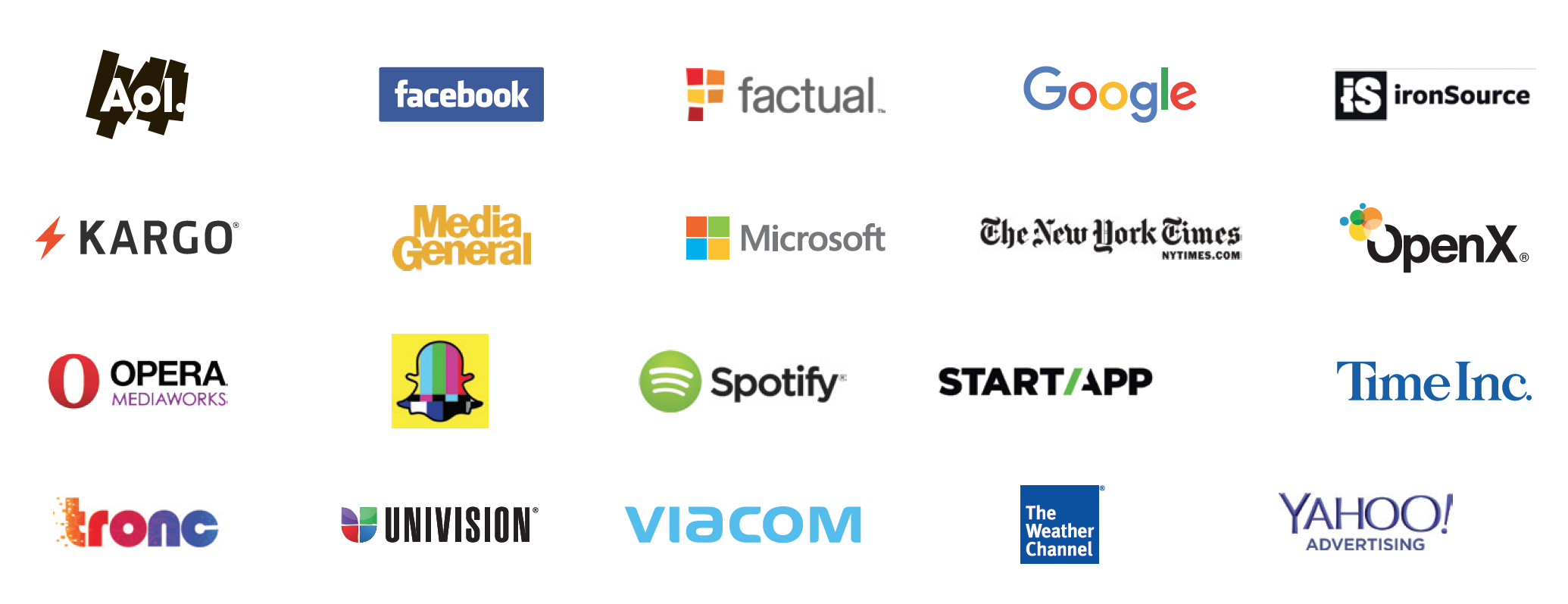
Mobile Center of Excellence 2016 Board Membership
Mobile World Congress
With the global market encompassing 3.6 billion mobile subscribers and 2.6 billion smartphones, the ability to reach and connect with people and businesses in today’s global media landscape requires much more than a mobile strategy. The most influential brand, agency, publisher, and technology leaders joined IAB and dmexco at Mobile World Congress in Barcelona, Spain, in February 2016, to discuss “Turning Mobile into Mobility: Innovation without Borders.” This invitation-only event, sponsored by Facebook, Google, and NASDAQ, gathered the most senior executives among the more than 94,000 attendees at Mobile World Congress.
Mobile Commerce: A Global Perspective
With the goal of understanding mobile commerce at a global level, IAB commissioned an in-depth survey of mobile users and purchasers from 19 countries around the world. The resulting study—released at this year’s MIXX conference “Mobile Commerce: A Global Perspective”—finds that mobile shopping and purchasing have become the norm across the globe, with 75 percent of smartphone and tablet users indicating they have purchased a product or service on their smartphone or tablet in the past six months. The study also finds that mobile ads and social media play an increasingly important role, triggering purchase interest and aiding product discovery. And within the universe of mobile shoppers, the study found that mobile wallet users are the most active and engaged consumers, making more frequent purchases on their mobile devices.
Mobile Location-Based Marketing
In early 2016, the Mobile Center released the “Mobile Location Data Guide for Publishers,” providing comprehensive information for publishers looking to tap into the power of geo-marketing. Offering practical advice for publishers on getting started using location data as well as how to expand and refine existing capabilities, the guide outlines key opportunities such as gaining a better understanding of mobile audiences, enhancing mobile inventory, and providing online-to-offline sales attribution insights to advertisers. The Mobile Center then hosted a town hall in July 2016, drawing on best practices from the guide. The event drew a packed audience of publishers, providing practical advice on how to leverage mobile location data to expand and refine existing targeting capabilities. It also highlighted the opportunity for publishers to gain location-driven insights from their mobile audiences, to enhance mobile inventory, and provide online-to-offline sales attribution, illustrating how local mobile campaigns can drive foot traffic to physical stores.
Mobile Marketplace 2016
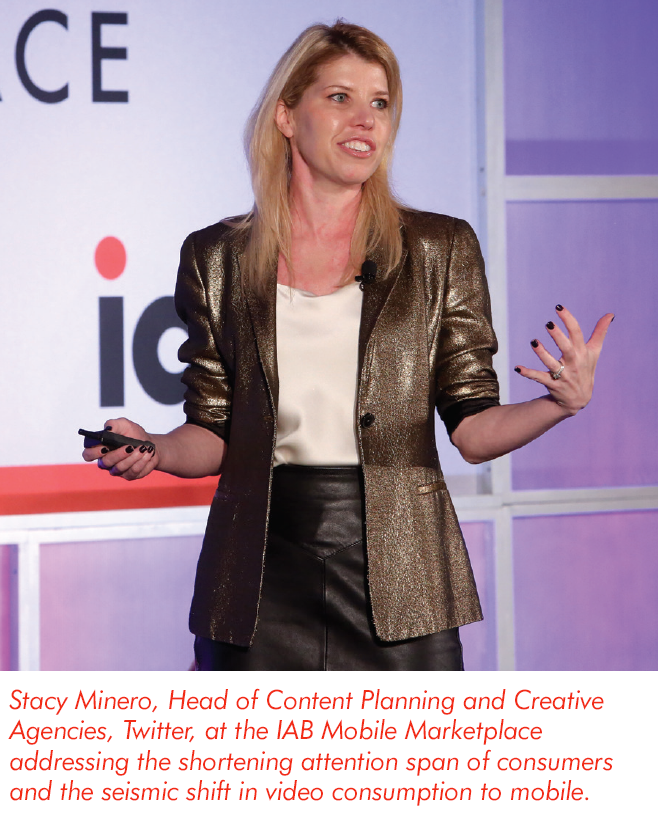 The 2016 Mobile Marketplace held in April convened leading brands, agencies, and publishers to discuss the way forward in creating content and brand experiences that flow fluidly across screens and borders.
The 2016 Mobile Marketplace held in April convened leading brands, agencies, and publishers to discuss the way forward in creating content and brand experiences that flow fluidly across screens and borders.
Today’s consumers expertly navigate content in any and all forms, on any and all devices, and publishers and marketers must create customizable experiences that are tailor-made to each and every moment. In particular, video consumption—both short- and long-form—has increased globally year-over-year, providing many more opportunities for media companies and brands to engage in this immersive format.
Mobile Center Fly-In
In April 2016, members of the Mobile Center of Excellence’s board of directors traveled to the nation’s capital for the fifth annual Mobile Center Washington, D.C. Fly-In. The two-day program included meetings with Congressmen, Senators, and key policy stakeholders. In their conversations with legislators, IAB representatives emphasized the collective role of self-regulation through industry-wide initiatives, such as LEAN, that develop and promote guidelines for consumer-centric ad and content experiences. Members of the Mobile Board also participated in a well-received panel at the “State of Net” conference, where they addressed the key role of advertising within the larger digital media ecosystem.
Demystifying Mobile Terms
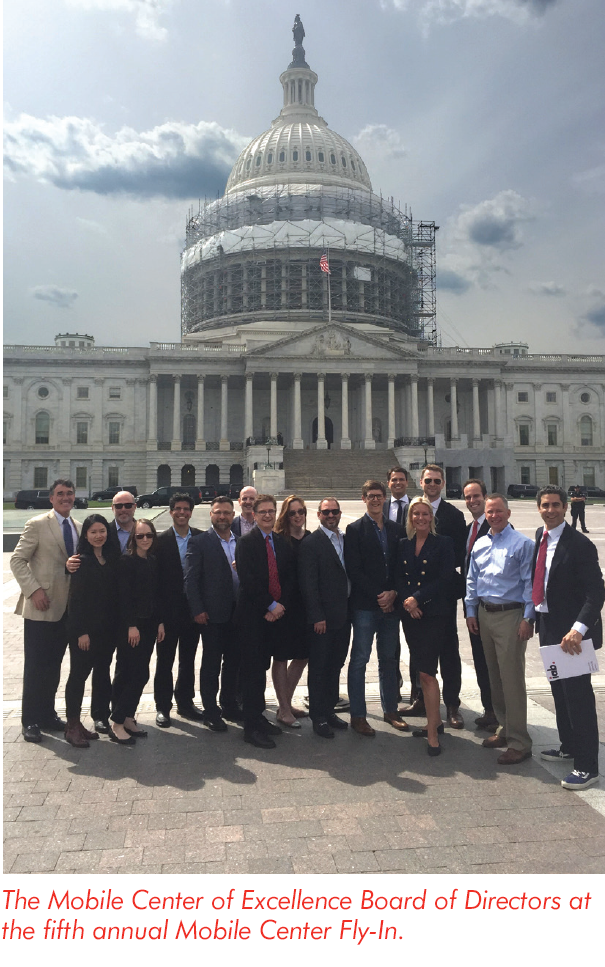 In October 2016, the IAB Mobile Center released the App Marketing Glossary, providing a much needed source of clear, concise definitions for commonly used terms in the rapidly growing app marketing industry. In 2015, mobile app install ads alone made up 25 percent of total U.S. mobile ad revenue, according to BI Intelligence. Primary tactics in app marketing include app installs, user retention and engagement, and app monetization. The glossary provides a one-stop shop of information for app developers looking to promote and monetize their apps, while streamlining communication and enabling smoother transactions between buyers and sellers within the app marketing ecosystem.
In October 2016, the IAB Mobile Center released the App Marketing Glossary, providing a much needed source of clear, concise definitions for commonly used terms in the rapidly growing app marketing industry. In 2015, mobile app install ads alone made up 25 percent of total U.S. mobile ad revenue, according to BI Intelligence. Primary tactics in app marketing include app installs, user retention and engagement, and app monetization. The glossary provides a one-stop shop of information for app developers looking to promote and monetize their apps, while streamlining communication and enabling smoother transactions between buyers and sellers within the app marketing ecosystem.
Make Mobile Work for Marketers and Agencies
The IAB Mobile Center continued its Make Mobile Work initiative with a series of informative webinars aimed at providing marketers and agencies with practical, jargon-free advice on how to make mobile advertising work in a multi-screen world. Webinar topics included “Build Creatives that Work Across Devices,” “Make Mobile Advertising Welcome by Consumers,” and “Going Beyond the Download: Engage Your App Users.” Over the course of 2016, the Make Mobile Work webinar series garnered over 1,000 registrants.
Data
Driving Transparency and Accountability in Data
The Data Center of Excellence was founded in 2016 to drive the “data agenda” for the digital media, marketing, and advertising industry. IAB Data Center’s mission is to help publishers, advertisers, and marketers operationalize their data assets while maintaining quality, transparency, accountability, and consumer protection. Joe Zawadzki, CEO of MediaMath, heads the Data Center of Excellence Board of Directors.
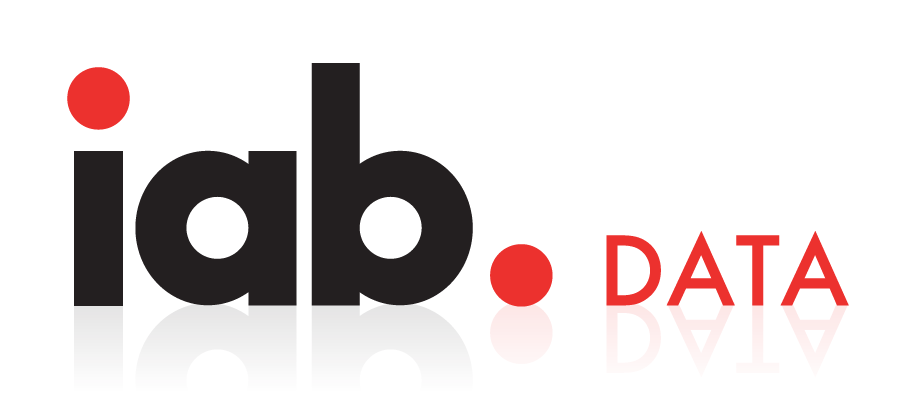
Data Center of Excellence 2016 Board Membership
The Outlook for Data
IAB Data Center’s first body of work was a study by IAB and Winterberry Group titled “The Outlook for Data 2016: A Snapshot into Digital Media and the Evolving Role of Audience Insight.” In the survey, 70 percent of responding marketers, media buyers, publishers, and digital advertising technology executives said that “cross-device audience recognition” is a key area of focus and innovation. The report also found that 58 percent of respondents believe cross-channel measurement and attribution will command significant time and attention in 2017.
Transforming for the Next Generation of Audience Marketing
IAB Data Center also partnered with the Direct Marketing Association (DMA) on a major piece of research conducted by Winterberry Group. The study, “The Data-Centric Organization: Transforming for the Next Generation of Audience Marketing,” was released in September 2016. The study, which surveyed over 200 advertisers, marketers, publishers, technology developers, and marketing service providers, reveals that one third are “confident”—and just five percent are “extremely confident”—that their internal teams have the right skills and experience to support their data-driven initiatives. In addition, 59 percent of those surveyed agreed that dissolving organizational silos would represent the most important step their businesses could take to derive more value from their use of audience data, which was the most striking takeaway from the study.
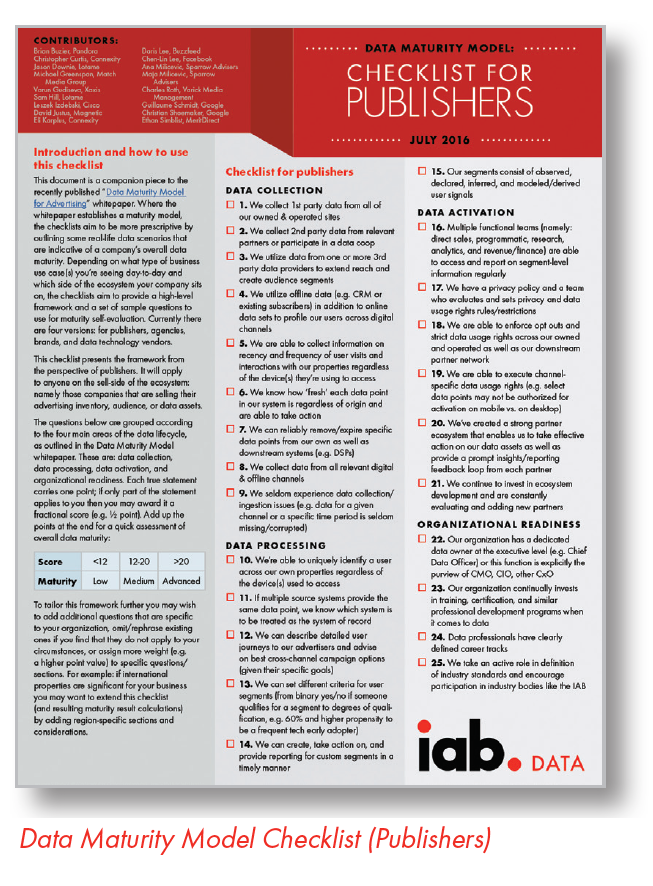
IAB Data Maturity Model
The IAB Data Maturity Model is a new benchmarking system that enables brands, agencies, publishers, and data technology vendors to determine where they or their clients and prospects rank in data usage sophistication, guiding further investment, implementation, and strategy. Released in July 2016, the model was detailed in both a white paper entitled “Data Maturity Model” and a companion website, featuring four customized checklists for self-evaluation. While the Data-Centric Org project provides a perspective on the industry at large, the Data Maturity Model allows an organization to assess its evolution relative to the industry.
Programmatic Fee Transparency Calculator
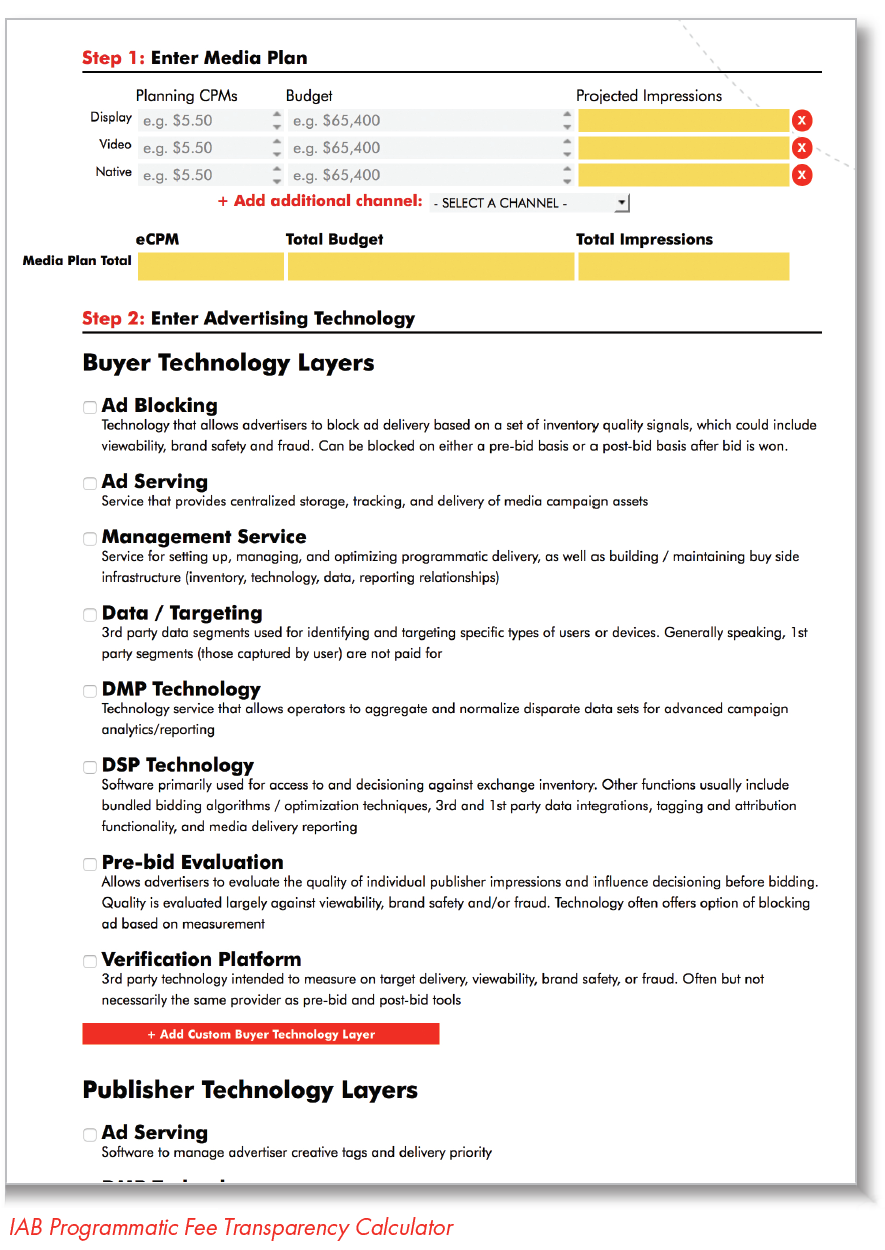 Advertisers and publishers need better tools for measuring programmatic costs, so in March 2016 the Programmatic Council launched a Programmatic Fee Transparency Calculator, an interactive tool that provides advertisers and publishers with a granular, partner-specific evaluation of their programmatic technology, service, and inventory costs as a percentage of their effective CPM. Calculator users can enter their media plan channels and cost structures, and the calculator organizes and quantifies these investments based on different suppliers’ roles in the supply chain. According to the 2014 IAB and PwC “Programmatic Revenue Report,” ad technology investments represent over half of programmatic expenditures. The calculator will reduce confusion about these fees, helping advertisers understand and control them.
Advertisers and publishers need better tools for measuring programmatic costs, so in March 2016 the Programmatic Council launched a Programmatic Fee Transparency Calculator, an interactive tool that provides advertisers and publishers with a granular, partner-specific evaluation of their programmatic technology, service, and inventory costs as a percentage of their effective CPM. Calculator users can enter their media plan channels and cost structures, and the calculator organizes and quantifies these investments based on different suppliers’ roles in the supply chain. According to the 2014 IAB and PwC “Programmatic Revenue Report,” ad technology investments represent over half of programmatic expenditures. The calculator will reduce confusion about these fees, helping advertisers understand and control them.
Data Lexicon
The world of online advertising has witnessed tectonic shifts in the last several years. While many fundamentals of interactive advertising have remained constant, the evolution of mobile online advertising and marketers’ use of data has introduced new terminology that requires standardization. As part of ongoing efforts to facilitate a shared understanding of how this data is used, the IAB Data Council developed a “Data Segments & Techniques Lexicon” which was extensively updated in early 2016. Whether thinking high-level about programmatic ad purchasing, or diving into geo-data or cross-device segmentation, there needs to be a common framework to keep pace with an industry in constant transformation.
IAB Members
We thank all of our members for their support throughout the year. With their leadership and participation, the influence of IAB on the industry will continue to grow. Twenty fifteen marked the first year the IAB General Membership criteria was expanded to include companies that “sell, distribute, or optimize digital advertising or marketing programs.” As a result, a number of previously Associate Member companies are now General Members and eligible to vote for and serve on the IAB Board of Directors, as well as chair IAB committees and councils.
New General Members
Activision
Adacado
AddNewer
Adelphic
Adsiduous Media
ADVR
Adyoulike
ALC
Alphonso
American Public Media
AudioHQ
Blippar
BroadSign
Charter Communications
Adelphic
CrossChannel
Dailymotion
Eko
Eyeota
Feature Forward
Gruuv Interactive
HookLogic
InfoSpace
Interpolls
Jellyfish
LogoBar Enterprises
Lucid Sight
Madhive
Media.net
Micro Cube Digital
Orange142
Parsec Media
Pixalate
Platform, Inc.
Playboy
Programmatic Mechanics
Public Media Marketing
Sekindo
SITO Mobile
Skimlinks
Smithsonian Media Group
Tech Mpire
Tiller
UberMedia
Unacast
Unity Technologies
Vertebrae
Viant
Vidillion
Viisights
ViralGains
Visa Advertising Solutions
VisualDNA
Wondery
Wrap Media
YellowHammer Media Group
Zergnet
General Members
33Across
4INFO
5min Media
A+E Networks
AARP
ABC News
ABC TV Network
About.com
Accordant Media
AccuWeather
ActionX
Acxiom
Adadyn
ADARA, Inc.
Adbrain
AdColony
AddThis
AdFin
Adform
AdGear
AdLarge Media
adMarketplace
AdMeld
Adobe
Adometry
AdoTube
AdRoll
Adslot
AdsNative
AdSpirit
Adswizz
ADTECH
Adtegrity
AdTheorent
Adversal.com
Advertising Age
AdYapper
AerServ
Affinity Express
Allrecipes.com
Alliant
Allrecipes
Altitude Digital
Amazon
AMC
AMC Networks Digital
American City Business Journals
American Express Publishing
American Media, Inc.
Amobee
Aniview
Anyclip
AOL
AOL Platforms
AppNexus
AT&T AdWorks
Atlanta Journal-Constitution
AtomShockwave
Audience Partners
AudienceScience
Auditude
Autotrader
BabyCenter
Baltimore Sun
Barron’s
Batanga Media
Bazaarvoice
BBC Worldwide
Beachfront Media
BET Networks
BidSwitch
Bidtellect
BlogHer
BlogTalkRadio
Bloomberg
Bloomberg Businessweek
Bounce Exchange
Brides Magazine
Bright House Networks
Brightcove
BrightRoll
Burst Media Corporation
BuzzFeed
C1 Exchange
Cable One Advertising
Cablevision Media Sales
Cablevision Systems Corporation
Cars.com
CBS Interactive
CBS Local
Celtra
Centro
Cheetah Media Link
Chicago Tribune
ChoiceStream
CIO
Clear Channel Outdoor
Clipcentric
CNN.com
Collective
Comcast Regional Sports Networks
Comcast Spotlight
Comedy Central
Complex Media
Condé Nast
Conde Nast, GQ Magazine
Connexity
Conversant Media
Convertro
Core Audience
Cox
Cox Automotive
Cox Enterprise
Cox Media
Cox Media Group
Cox Reps
Cox Target Media
CPXi
Crackle
Crain Communications
Criteo
CSO Online
Daily Press
DailyMail.com/Elite Daily
DashBid
DataXu
Dealer.com
Defy Media
Delivery Agent
Demandbase Departures
Digilant
Digital First Media
Digital Photography Review
Discovery Communications
DISH
Disney Interactive
Dominion Digital Media
Dow Jones & Company (Wall Street Journal)
Drawbridge
Dstillery
Earth Networks
eBay
Ebiquity
Efficient Frontier
Electric Sheep
Electronic Arts
eMarketer
Emogi
engage:BDR
Entertainment Weekly
Epom
Equinix
ESPN.com
Essence Magazine
Everyday Health
eXelate
Expedia Media Solutions
Experian Marketing Services
Extreme Reach
eyeReturn Marketing
Eyeview
Facebook
Factual
Fandom powered by Wikia
Fans 1st Media
Fast Company
FatTail
Feature Forward
Federated Media
Firefly Video
Flashtalking
Flipboard
Flite
Fluent
Flurry
Food & Wine
Forbes Media
Fortune
Foursquare
FOX Networks Group
FOX News Channel
Fox Sports
FreeWheel
Fullscreen
Gamut
GasBuddy
Genesis Media
Golf Digest
Golf Magazine
Goodway Group
Google
GQ Magazine
Grab Media
Grapeshot
Greenhouse Group
GumGum
Hanley Wood
Hartford Courant
Harvard Business Review
Haystak Digital Marketing
Health.com
HealthiNation
Hearst Magazines Digital Media
HIRO-Media
Hotels.com
Hotwire
Hulu
HyprMX Mobile
I-Behavior
IDG Communications
IDG Consumer & SMB
IDG TechNetwork
IFC
iFilm
IGN Entertainment
iHeartMedia
ImServices Group
Inc.com
Index Exchange
INFORM
InMobi
Inneractive LTD
Innity
Innovid
InStyle
Intersection
Investor’s Business Daily
Iponweb
IRI
IronSource
Jivox
JUICE Mobile
Jumpstart Automotive Media
Jun Group
JW Player
Kantar Media
Kantar Video
Kargo
KBM Group
Kelley Blue Book
King Entertainment
Kiosked
Kochava
Krux
Krudzu
LA Times
Leaf Group Ltd.
Legacy
Libsyn
LIN Digital
LinkedIn
Liquidus
Lithium | Klout
Live Nation
LiveIntent
LiveRail
LiveRamp
Lonely Planet
Lotame
LotLinx
Machinima
Madison Logic
Magnetic
Major League Gaming
Maker Studios
Mansueto Ventures
Marchex
Markit On Demand
Mashable
Match Media Group
Matomy Media
MaxPoint
MEC Global
Media General
Mediabrix
Medialets
MediaMath
MediaOcean
Mediative
Medicx Media Solutions
Meredith Digital
MeritDirect
MGID
Micro Cube Digital Limited
Microsoft Advertising
Midroll Media
Minnesota Public Media
Mirriad
Mixpo
MODE Media
MONSTER
MoPub
Morningstar
MTV
Multiview
my6sense
MySpace
Nanigans
NASCAR
National Football League (NFL)
National Geographic
National Public Media
Nativo
Nature Publishing Group
NBCUniversal
NCC Media
Netmining
NetSeer
Network World
Neustar
New York Post
New York Public Radio
News Corporation
Newsday
Nexstar Digital
Nick, Jr
Nickeodeon
NinthDecimal
NovoRoll
NPR
Ooyala
OpenX
Opera Mediaworks
Opera Software
Optimatic
Optonline
Oracle
Orlando Sentinel
Outbrain
Outfront Media
OWN: The Oprah Winfrey Network
OwnerIQ
PadSquad
Pandora
Panoply
Paramount Motion Pictures
PBS
PC World
People
People En Espanol
Persado
PGA TOUR
Pinterest
Pixability
PlaceIQ
PodcastOne
Podtrac
POPSUGAR
Positive Mobile
PowerLinks Media
Prisa Digital
PROXi Digital
Publishers Clearning House Digital (PCHdigital)
PubMatic
PulsePoint
Purch
PushSpring
Quantcast
Quotient
Radar Online
RadiumOne
Rakuten Marketing
Rare
RawVoice
Reader’s Digest Association Interactive
Real Media Group
Real Simple
Realtor.com
Realvu
Reelz
Refinery29
Resonate
Reuters
Revision3
RevJet
RhythmOne
Rocket Fuel
Rodale
Roku
Rubicon Project
RUN
Salesforce Marketing Cloud
Samsung Electronics America
SAS Institute
Savings.com
Scripps Networks Interactive
Semcasting
Shareablee
ShareThis
Sharethrough
SheKnows
Shopping.com
Signal
Simpli.fi
Simulmedia
Sizmek
Skyhook Wireless
Slate
Smaato
SmartyAds
SnapChat
Social Reality
Sonobi
Sony Pictures Television
Southern California Public Radio
Southern Living
Sovrn
Specific Media
Speed Shift Media
Spike TV
Spongecell
Sports Illustrated
Spotify
SpotX
StartApp
STEEL MEDIA
SteelHouse
StickyADS.tv
Strategy& (formerly Booz & Company)
Strategy+Business
StubHub
Sublime Skinz
Sundance Channel
SundaySky
Swoop
Swyft Media
Synacor
Taboola
Tapad
Tapjoy
TargetSpot
Taunton Interactive
Teads
Technorati Media
Telemetry
Telemundo
Teradata
Terra Networks USA
Test Com
The Daily News
The Exchange Lab
The Guardian
The Huffington Post
The Morning Call
The New York Times Company
The New Yorker
The Trade Desk
The Wall Street Journal Digital Network
The Weather Channel, and IBM Business
TheStreet.com
Thinknear by Telenav
This Old House
Time Inc.
Time Out America
Time Warner Cable
Travel+Leisure
Tremor Video
TreSensa
Triad Retail Media
Tribal Fusion
TripAdvisor
TripleLift
Triton Digital
Trivver
Tronc
true[X]
TruEffect
TubeMogul
Tubular Labs
Tumblr
Turn
Turner Broadcasting System
TV Land
Twitch
Undertone
Univision
Unruly
US News & World Report
USATODAY.com
Utah.com
V12 Group
Valassis and Brand.net
Valpak
Vdopia
Verizon Wireless
VertaMedia
Verve Mobile
VEVO
Viacom Media Network
Vibrant Media
VIDEA
video intelligence AG
VideoAmp
Videology
Vidible
Vindico
Virool
Visible Measures
VISIT FLORIDA
Warner Bros. Media
Research
Washington Post Digital
Watchwith
WebMD
WebSpectator
Westwood One
WE tv
WideOrbit
Wiland
Wildfire
WNYC
Worldata
WorldNow
Woven Digital
WWE
xAd
XappMedia
Xaxis
XFire
XUMO
Yahoo
Yahoo en Espanol
YieldMo
YouTube
YP
YuMe
ZEDO
Zefr
Zemanta
Ziff Davis
ZUMOBI
Zynga
New Associate Members
Advertiser Perceptions
AIG
Cadreon
Coalition for Innovative Media Measurement (CIMM)
Good Apple Digital
Instart Logic
iOPEX Technologies
Magna Global
Pumpt
Purina
Sensewhere
Sourcepoint
Taco Bell
Teralytics
Throtle
Verto Analytics
Associate Members
AAM
Ace Metrix
Active International
Ad-iD
ADLOOX
Archer Advisors
Authenticated Digital
Avant Digital Media
Bartle Bogle Hegarty
BIA/Kelsey
Bionic Advertising Systems
Bonzai
BPA Worldwide
BrightLine
Burt
CDK Digital Marketing
Cisco
ClarityAd
Clearstream.TV
Crowdtap
Dell
Deloitte & Touche
DeviceAtlas by dotMobi
Dieste
DoubleVerify
Dun & Bradstreet
DWA
Epsilon
EY
Forensiq
GeoEdge
GfK North America
Ghostery
GroupM
Havas Media
iCrossing
IHG
Infinitive
Integral Ad Science
Intel
IPG Mediabrands
Ipsos
Media Management Inc.
Media Rating Council
MediaLink
Merkle
Millward Brown Digital
Moat
Monotype
Nestle Purina
News Media Alliance
Outsourced Ad Ops
Pivnet
PMX Agency
PricewaterhouseCoopers
Prohaska Consulting
Projectize Media
Research Now
ResponsiveAds
Revolution Messaging
RiskIQ
Rokkan
Sales Athlete Media Network
Sorenson Media
Szabo Associates
Tania
Television Bureau of Advertising
The Center For Sales Strategy
The Media Trust Company
Theorem
TiVo Research
Toluna
Unilever
Varick Media Management
Visual IQ
VivaKi
White Ops
Winterberry Group
zVelo
IAB Tech Lab Members
All IAB U.S. general members are automatically members of the IAB Tech Lab.
Additional members include:
Admiral Adblock Publisher Solutions
AndBeyond.media
Authenticated Digital
Baverianvine
Blockthrough
Cedato Technologies
ClarityAd
Cognitiv
Double Verify
Ghostery
GroupM
Improve Digital
Instart Logic
Integral Ad Science
LogoBar Enterprises
Lucid Sight
Moat
Momentum
Monotype
Monotype
Neuranet
PageFair
Pivnet
ResponsiveAds
Sourcepoint
Teralytics
The Media Trust Company
Tiller
Unacast
White Ops
Widespace
Yahoo Japan Corporation
Committees and Councils
Though the efforts of committees and councils in various industry segments, IAB helps drive the industry forward. These groups include the brightest minds in the industry and work together to develop solutions that improve the interactive advertising and marketing ecosystem for everyone.
IAB committees are based on specific platforms within the digital advertising medium. Committee members work together to prove platform value or simplify the processes for buying, selling, and creating interactive advertising.
IAB councils are based on specific industry roles within members’ organizations. Council members share best practices and develop tools to improve efficiency, provide thought leadership, and grow digital advertising.
Committees and Councils
Chris Falkner, NBCUniversal, Co-Chair
Adam Lowy, DISH, Co-Chair Audio Committee
Scott Liss, iHeartMedia, Co-Chair
Douglas Sterne, Pandora, Co-Chair B2B Committee
Andrew Goldman, LinkedIn, Co-Chair
Steven Suthiana, Mansueto Ventures, Co-Chair Digital Out of Home Committee
Rainbow Kirby, Clear Channel Outdoor, Co-Chair
Margit Kittridge, Intersection, Co-Chair Digital Video Committee
Matthew B. Corbin, Facebook, Co-Chair
Jarred Wilichinsky, CBS Interactive, Co-Chair Games Committee
Kym Nelson, Twitch, Co-Chair
Julie Shumaker, Unity Technologies, Co-Chair Local Committee
Kristen Berke, tronc, Co-Chair
Nickelle Sletteland, Verve Mobile, Co-Chair
Kurt Hawks, Conversant Media, Chair Native Advertising/Content Committee
Ari Lewine, TripleLift, Co-Chair
Ann Marinovich, Forbes Media, Co-Chair
Asher Rapkin, Facebook, Co-Chair Performance Marketing Committee
John Busby, Marchex, Co-Chair
Neil Hoyne, Google, Co-Chair Social Media Committee
Christine Cuoco, Twitter, Co-Chair
Carine Roman, LinkedIn, Co-Chair Ad Ops Council Advertising Technology Council CFO Council
Michael Waxman-Lenz, Undertone, Chair Data Council
Khurrum Malik, Facebook, Chair Legal Affairs Council
Stephen Hicks, Ziff Davis, Chair Multicultural Council
Diego Antista, Google, Co-Chair
Liz Blacker, iHeartMedia, Co-Chair Programmatic Council
Bob Arnold, Google, Co-Chair
Jason Fairchild, OpenX, Co-Chair
Jason White, CBS Interactive, Co-Chair Public Policy Council Research Council
Stephanie Fried, Condé Nast, Co-Chair
Dan Murphy, Univision, Co-Chair
Working Groups and Task Forces
Working groups are formed by members of committees and councils. They are smaller, more focused groups of members and aim to complete a project, initiative, or committee action that requires member contributions.
Task forces are created to address an industry challenge or topic that is emerging and requires discussion, definition, and development of an IAB perspective. The groups may transition into a committee or council should the topic require numerous and long-term resources. Task forces are made up mostly of invited members and may include non-member partners should their expertise be required to move forward.
IAB Working Groups and Task Forces
Ad Effectiveness Studies Working Group
Advanced Attribution Working Group
Audio Events Working Group
Compensation Working Group
Connected Car Working Group
Cross Platform Ad Effectiveness Research Working Group
Cross Platform Measurement Issues Working Group
Data Measurement Research Working Group
Data Revenue Report Working Group
Digital Audio Buyers Guide Working Group
Digital Video Glossary Working Group
Diversity and Inclusion Task Force
Header Bidding Working Group
Messaging App Marketing Working Group
Mobile App Marketing Working Group
Mobile Location Data Working Group
Mobile Measurement Task Force
Mobile Video Task Force
Modernizing Measurement Task Force
Native Advertising Playbook – V2 Working Group
OTT Video Working Group
Podcast Business Working Group
Programmatic Fee Transparency Working Group
Programmatic Lexicon Working Group
Programmatic Video Working Group
Retailers’ Location Data Guide Working Group
The Comprehensive Multicultural Guide
Vertical Video Working Group
Video Center T&Cs Steering Committee Working Group
IAB Tech Lab Working Groups and Task Forces
Digital Video Ad Format Guidelines Working Group
Digital Video Technical Standards Working Group
Display Creative Guidelines Working Group
Dynamic Content Ad Standards Working Group
Header Tag Task Force
HTML5 Best Practices Task Force
In-App Viewability Measurement Standardization Working Group
Mobile Rich Media Ad Interface Definitions (MRAID) Working Group
OpenData Task Force
OpenDirect Working Group
OpenRTB Compliance Working Group
OpenRTB Native Working Group
OpenVV Work Group
Podcast Technical Working Group
Taxonomy and Mapping Working Group
TV Convergence Technical Task Force
IAB Committees and Councils at Work
Solutions that Improve the Digital Ad Ecosystem
Comprised of representatives from IAB member companies, committees and councils drive the industry forward in industry segments that are vital for our members with in-depth research, best practices development, and other essential activities. In 2016, these groups were indispensable in developing practical and scalable solutions for the benefit of the industry, particularly in the areas of digital audio, digital out-of-home, native advertising, and gaming.
Innovation in Digital Audio
The demand for digital audio is growing, driven by connected lives that rely more and more on mobile devices. In September 2016, the IAB Audio Committee worked to produce the IAB Podcast Upfront, a one-day marketplace designed for advertisers and media buyers to preview the latest in innovative podcast programming from some of the biggest names in the digital audio arena.
The event aimed to educate and raise awareness around the power of podcasts as a valuable platform to reach consumers, and nearly doubled in size this year. Leaders in the podcast space spoke to an engaged audience including keynotes from Questlove, Malcolm Gladwell, and more. At the event, the Audio Committee released the “IAB-Edison Research Podcast Advertising Study” which surveyed nearly 1,000 podcast listeners and found that 65 percent of fans are more willing to consider purchasing products and services they learn about during a podcast.
IAB, along with members of the Digital Audio Committee, have pursued a goal of educating marketers and agencies about digital audio advertising opportunities, and discussing best practices and guidelines for reducing operational costs while driving sector growth. The November 2016 release of the “IAB Digital Audio Buyer’s Guide” dives further into these points and answer questions that creatives, planners, and buyers have about investment in digital audio advertising.
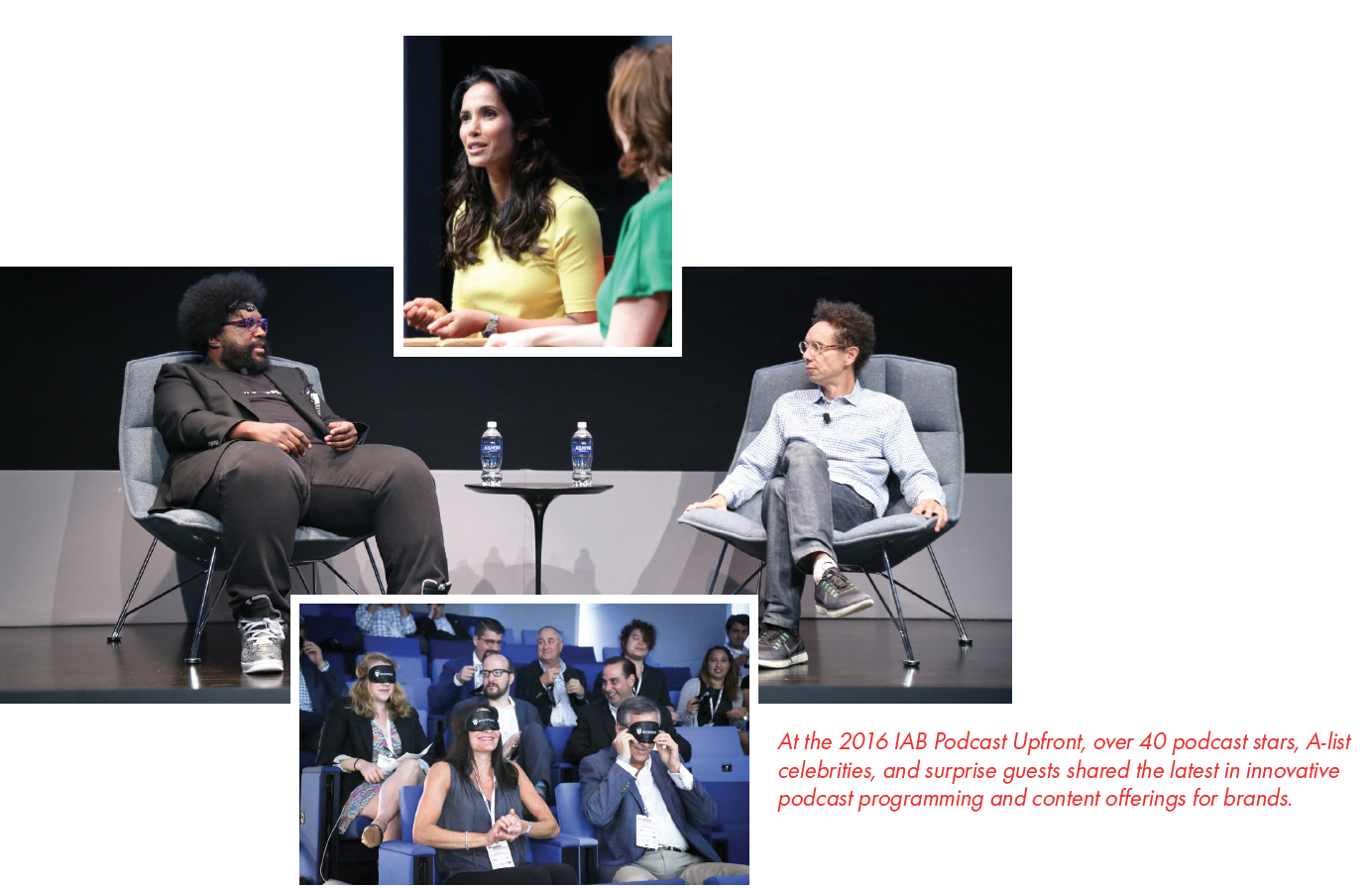
Understanding Digital Out-of-Home Experiences
The Digital Out-of-Home (DOOH) Task Force released the “Digital Out-Of-Home Buyer’s Guide” in February 2016, with an accompanying blog post on IAB.com. The report highlighted the strong and steady growth of Digital Out-of-Home as well as opportunities for marketers who have considered investment in DOOH. To bring this accomplishment to life, the DOOH Task Force hosted a breakfast event at IAB’s AdLab in May 2016 to create a live discussion on the topic of “Blurred Lines Between Digital Out-of-Home and Mobile.”
Native Advertising and Social Measurement
For Native, much of IAB’s focus was on disclosure in light of the December 2015 FTC guidance. In March 2016, IAB welcomed Laura Sullivan from the Federal Trade Commission (FTC) Bureau of Consumer Protection, who for a second time visited IAB in New York where she discussed the FTC guidance in a fireside chat with IAB’s Brad Weltman. In December 2016, IAB hosted a member-only webinar with IAB Public Policy and Venable to outline the differences between FTC Native and FTC Endorsement guidance in light of 2016 FTC actions.
The IAB voice was represented at the Content Marketing World conference in Cleveland in September 2016 with a panel titled “Great Content. Now What Are You Going to Do With It?” The panel featured co-chair leadership speakers from LinkedIn, Forbes, and TripleLift who exchanged viewpoints on various paid content distribution options. IAB ended the year with a predictions piece featuring 28 member contributions about what will stay the same or change in 2017. Most agreed that mobile, video, and data will be the native game changers.
On the social media front, IAB was represented at Social Media Week to discuss the Media Rating Council (MRC) Social Media Measurement Guidelines issued in December 2015. IAB moderated a panel with executives from MRC, 4A’s, WOMMA, and The Coca-Cola Company to discuss how the entire industry can win with these guidelines in place.
Advertising and Messaging Apps
A working group comprised of approximately 40 members from the Native, Social, and Mobile Committees, published a document in December 2016 which serves as a helpful first step in providing both publishers and marketers with some basic parameters for evaluating the various options in this rapidly evolving space in the U.S. It also emphasizes the importance of putting the consumer first when it comes to marketing activations. Alongside that, the group hosted a Messaging Case Study event to share industry best practices with members featuring speakers from Facebook Messenger, The Washington Post, Match Media, Swyft Media, and more.
Game Advertising Focus on Brands
In March 2016, the Games Committee was once again represented at SXSW with a panel titled “How All Brands Can Win with Game Advertising” featuring Facebook, Nielsen, and Twitch. The Game Committee also held its first ever Game Advertising Showcase in July 2016. The event featured research from Nielsen and Unity along with brand advertising case study presentations from Twitch, MediaBrix, TreSensa, Zynga, and Absolut Labs. Over 350 participants registered for the event which was held at Tumblr headquarters in New York City. In November 2016, a shorter version of the Game Case Study Showcase was presented at Social Media Week in Chicago to a largely buy-side audience.
Multicultural Best Practices
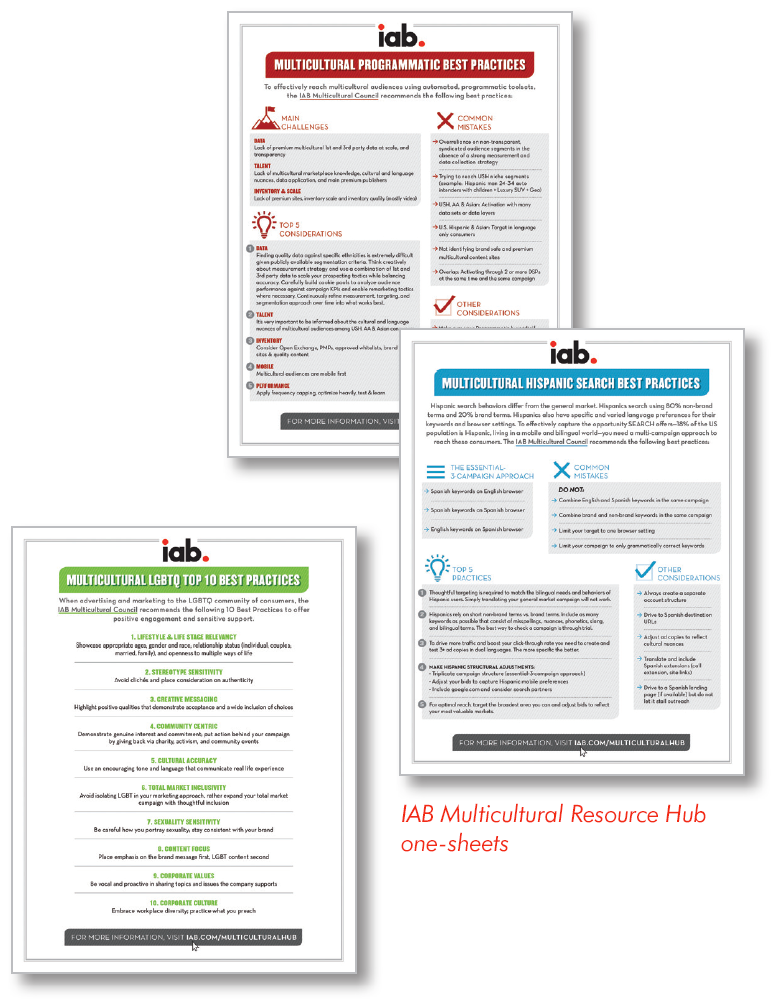 The IAB Multicultural Council hosted a Multicultural Day at Google. The Council also launched the IAB Multicultural Resource Hub on iab.com, an initiative to establish best practices that will support buy-side agency and brand partners in navigating multicultural advertising in the “new America.” Council members wrote and published three “Best Practices” pieces: “Multicultural Search,” “LGBTQ Top 10 Best Practices,” and “Multicultural Programmatic Best Practices” to navigate challenges, develop authentic creative, and help marketers be more effective.
The IAB Multicultural Council hosted a Multicultural Day at Google. The Council also launched the IAB Multicultural Resource Hub on iab.com, an initiative to establish best practices that will support buy-side agency and brand partners in navigating multicultural advertising in the “new America.” Council members wrote and published three “Best Practices” pieces: “Multicultural Search,” “LGBTQ Top 10 Best Practices,” and “Multicultural Programmatic Best Practices” to navigate challenges, develop authentic creative, and help marketers be more effective.
B2B Digital Predictions
Following the publication of a B2B Committee member crowdsourced B2B 2016 Digital Predictions piece, the committee agreed to prepare a B2B KPI report. Despite the diverse composition of the nearly 150 active committee members, one resounding similarity shone through: B2B marketers have moved well beyond the click as a leading metric of success, and are moving toward a more holistic view of digital campaign effectiveness.
Measurement
Ad Effectiveness and Standards for Cross-Platform Success
The ability to count media exposures and message frequency across channels is foundational to assessing ad effectiveness and the relative contributions of individual touchpoints towards marketing objectives. IAB is committed to helping the industry define metrics across all forms and media formats—including mobile video, native, and audio—to make cross-media planning, buying, and analysis comparable, so brand advertising budgets can flow to digital media.
Improving Ad Viewability
To continue supporting the tremendous progress made in viewable ad impressions in the marketplace, at the beginning of 2016 IAB distilled and outlined a range of successful tactics for improving ad viewability in the first “Primer for Publishers on Improving Ad Viewability.” The purpose of the primer was to guide publishers in their endeavors to increase the viewability of display and video ads on their sites, thus improving the value of those ads for advertisers and marketers, while also delivering a better user experience. The primer identifies four primary levers that can drastically improve ad viewability: engaging editorial content, site redesign, latency improvements, and ad tech strategy and policy changes. IAB hosted a 3MS Educational Forum in March 2016 to present and discuss the primer and foster industry-wide conversation on improving viewability.
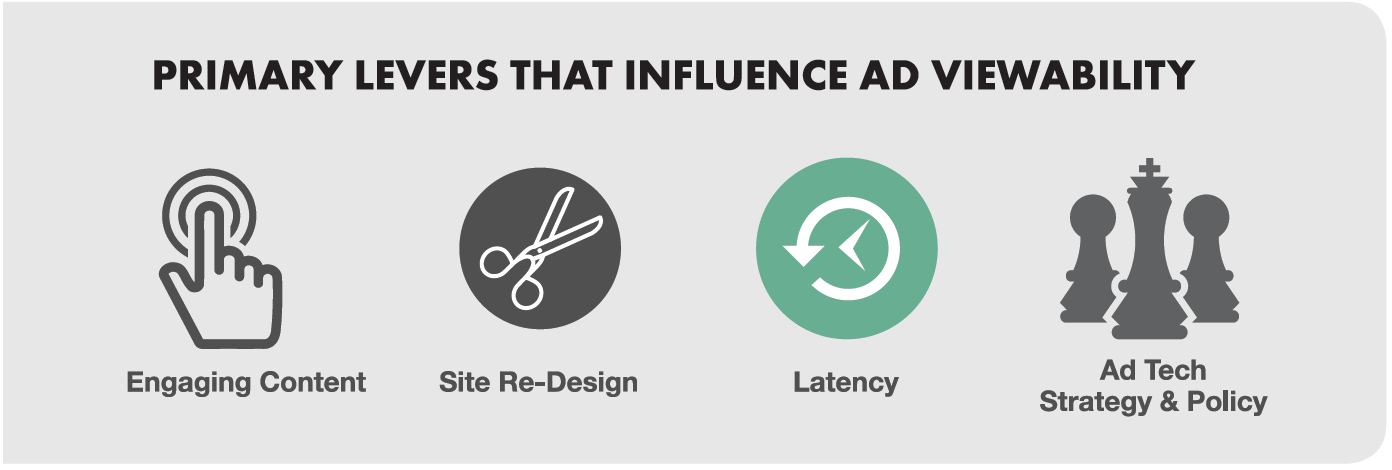 IAB is taking a more aggressive stance towards agencies’ inconsistent practices and resistance to industry consensus, including an op-ed in AdAge entitled “It’s Time to Fix the Viewability Tower of Babel.” IAB is shining a bright light on this issue and calling the industry to the table to collectively solve this problem. Duration-based metrics are the next step, and IAB made strides in 2016 to begin to address this challenge as well.
IAB is taking a more aggressive stance towards agencies’ inconsistent practices and resistance to industry consensus, including an op-ed in AdAge entitled “It’s Time to Fix the Viewability Tower of Babel.” IAB is shining a bright light on this issue and calling the industry to the table to collectively solve this problem. Duration-based metrics are the next step, and IAB made strides in 2016 to begin to address this challenge as well.
Continued Updates on Ad Impression Measurement
To promote improved digital advertising measurement and strive for measurement alignment across platforms, IAB has continued efforts to update ad impression measurement on both mobile and desktop.
In April 2016, IAB, in collaboration with the Mobile Marketing Association (MMA) and the Media Rating Council (MRC), released the updates to the Measurement Guidelines for mobile web and mobile in-app advertising in the “Mobile Web Advertising Measurement Guidelines” (version 3.0) and “Mobile Application Advertising Measurement Guidelines” (version 2.0). This important update eliminates “count on decision” as an option for reporting served impression counts to ensure that counting occurs only after an ad is actually delivered to a mobile app or browser.
In December 2016, IAB, MRC, and the Mobile Marketing Association (MMA) released major overhauls to the “Mobile In-App Measurement and Mobile Web Measurement Guidelines” for public comment. The revised guidelines shift both mobile in-app and mobile web from a “count-on-download” minimum to a “count-on-begin-to-render” ad impression measurement minimum. The change will better align measurement of these impressions with the counting model in place for viewable impressions. At the same time, IAB, IAB Tech Lab, and the MRC also introduced a proposed revision to the “Desktop Display Served Impression Guideline,” shifting desktop digital ad measurement away from a minimum of “count-on-ad-insertion” approach to a “count-on-begin-to-render” model. With this move, mobile and desktop measurement will be more closely in sync with digital video measurement.
Mobile Viewable Advertising Impression Measurement Guidelines
The MRC, together with IAB, MMA, and other 3MS members issued the final version of its “Mobile Viewable Advertising Impression Measurement Guidelines” in June 2016. The final version was based in part on cross-industry input received during a 30-day public comment period. The document offers guidance for measuring viewable impressions in mobile web and mobile in-app environments and supersede all previous MRC guidance on the measurement of viewable impressions of advertising that appears in mobile environments. The final release of the “Mobile Viewability Guidelines” represents the last step in “Defining Impressions,” the first principle within Making Measurement Make Sense’s (3MS) five principles of digital measurement. With Viewable Impressions—across desktop and mobile environments—now clearly defined, MRC and 3MS will move forward to address digital and cross-media audience currency.
Understanding Attribution and Cross-Screen Paths to Conversion
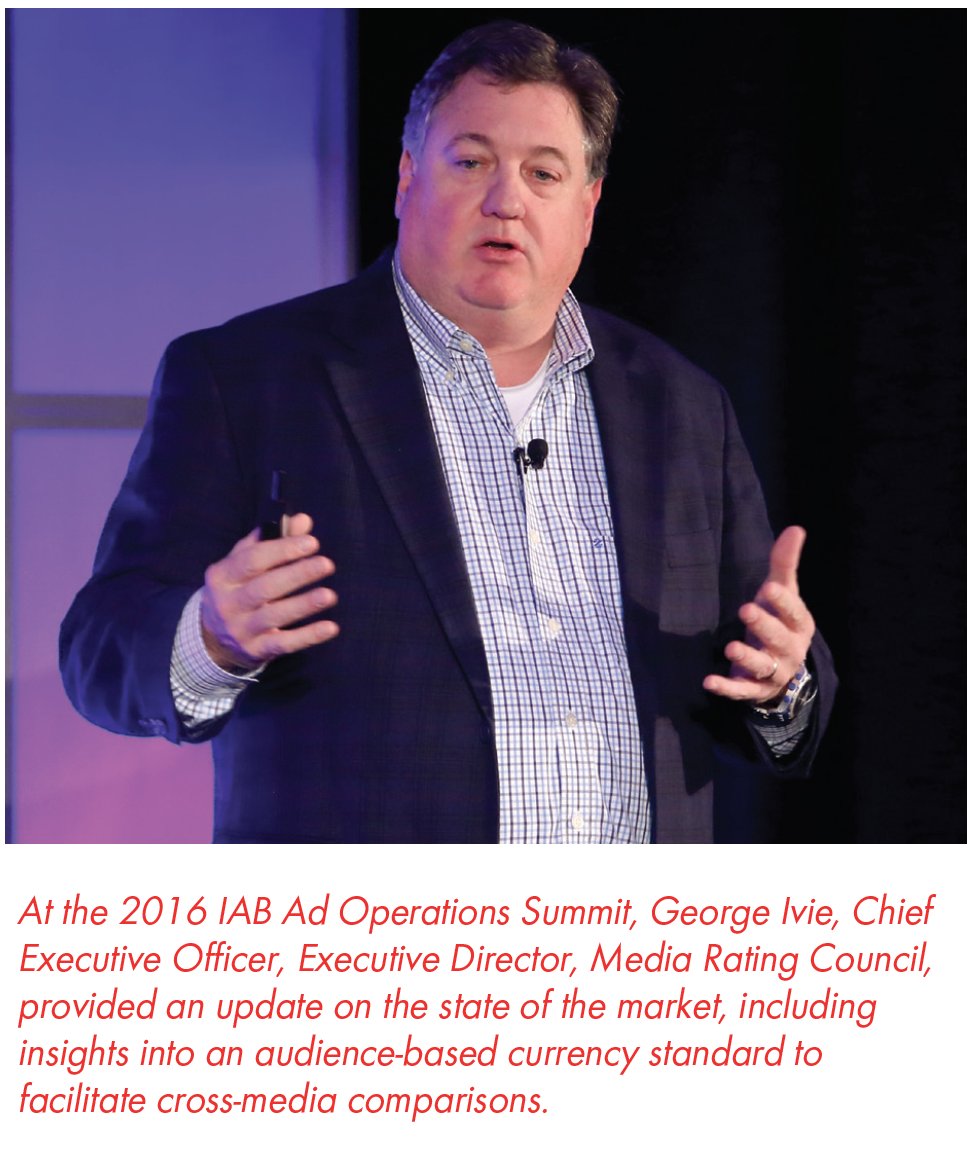 As the industry acclimates to the unprecedented control and precision that programmatic tools afford, there has yet to be sufficient progress in one important area: attribution. To address this gap, the IAB Performance Committee focused specifically on buy-side attribution guidance in 2016, ensuring the industry has a well-researched, descriptive overview of the fundamental techniques and data points that practitioners use to assemble a single user-level view of media exposure across channels, as well as the primary methodologies used to assign value to those touchpoints. Captured in a revamped “Attribution Primer 2.0”—the first significant overhaul of IAB’s attribution guidance since 2012—this rebuilt and modernized document accounts for the many developments in cross-screen measurement and data collection over the past five years, and fills six specific gaps in previous marketplace guidance:
As the industry acclimates to the unprecedented control and precision that programmatic tools afford, there has yet to be sufficient progress in one important area: attribution. To address this gap, the IAB Performance Committee focused specifically on buy-side attribution guidance in 2016, ensuring the industry has a well-researched, descriptive overview of the fundamental techniques and data points that practitioners use to assemble a single user-level view of media exposure across channels, as well as the primary methodologies used to assign value to those touchpoints. Captured in a revamped “Attribution Primer 2.0”—the first significant overhaul of IAB’s attribution guidance since 2012—this rebuilt and modernized document accounts for the many developments in cross-screen measurement and data collection over the past five years, and fills six specific gaps in previous marketplace guidance:
- The need to incorporate user-level, deterministic, and probabilistic device mapping as a necessary foundation for understanding cross-screen path to conversion
- The centrality of path-to-conversion analysis to allow practitioners to infer behavioral scenarios that are likely to produce desired outcomes
- The general consensus on how to apply credit to events in path: simplistic approaches, fractional rules-based approaches, and fractional algorithmic approaches
- The need to account for online-to-offline attribution options, specifically visitation, purchases, and phone calls
- Descriptions of common challenges around attribution model scope, optimization lag, and managing optimization throughout the purchase funnel
- Overview of the need for practitioners to focus on better, not perfect solutions, and to iterate and refine methodologies over time, given the tools available to the industry
IAB Research
The research produced by IAB helps guide and advance the digital media and advertising industry by delivering information that our members and partners need to build brands and business—and inform them how media matters.
Digital Video
Video Landscape Report
As part of our continued effort to simplify video and educate the advertising marketplace about the growth and value of video, this report was compiled from existing industry research and analysis, and consultations with more than a dozen industry practitioners and subject matter experts from broadcast, cable, ad tech, digital pure plays, agencies, and brands.
2016 Original Digital Video Study
This study was part of a comprehensive research program around the NewFronts, tracking consumer attitudes, awareness, and usage of original digital video. In its fourth year, the purpose of this study is to benchmark how many consumers are watching original digital video, and to inform the buying community about what consumers do, watch, think, and feel about original, professionally produced digital video content.
2016 IAB Digital Video Ad Spend Study
In its fourth year, this annual IAB survey revealed the NewFronts’ direct impact on ad spend: 8 in 10 attendees spend more than planned on original digital video advertising, with TV-focused buyers spending more upfront while digital-focused spend more throughout the year. Advertisers and media buyers have doubled their investments in original digital video programming over the past two years.
Data
The Data-Centric Organization: Transforming for the Next Generation of Audience Marketing
A white paper showing that a lack of talent and ongoing functional silos are major hurdles to taking full advantage of “big data.”
The Outlook for Data 2016: A Snapshot into Digital Media and the Evolving Role of Audience Insight
This inaugural study found that digital media practitioners focused their 2015 efforts predominantly on the continued expansion of their programmatic display media buying initiatives. In the year ahead, these same stakeholders expect to shift their attention and resources to programmatic approaches across emerging channels and formats—as well as to develop solutions for audience recognition across devices.
Digital Influence
IAB Online Holiday Shoppers and Digital Influence
One-third of holiday shoppers plan to do most of their shopping online, and these online-first holiday shoppers tend to be younger with higher incomes. They are also more likely than the general population to research and buy gifts using their smartphones.
The Race for the White House 2016: Registered Votes and Media and Information During the Primaries
Digital media has reached parity, with TV as a primary information source about presidential candidates (61 percent for both digital and TV) and political issues (67 percent for digital vs. 69 percent for TV) among registered U.S. voters. More politically involved and influential voters rely on digital sources more than on TV for candidate and issue information.
Ad Blocking
Ad Blocking Report: Who Blocks Ads, Why and How to Win Them Back
An IAB consumer research study that examines drivers of ad blocking, including which ad elements rank highest in annoyance, and follows up with testing potential solutions to ad blocking. The research shows that while 27 percent of consumers block ads, two-thirds of U.S. consumers using ad blockers can be convinced to uninstall their ad blocking software.
Emerging Technology
The Internet of Things
Nearly two-thirds (62 percent) of Americans own at least one internet of things (IoT) connected device, and 65 percent are considering buying one. The report explores consumer attitudes and usage of various connected devices along with a profile of who these device owners are. The study takes a further look into consumer attitudes towards messaging and the potential for ads on such devices, revealing that 65 percent are willing to receive ads on IoT screens in exchange for offers.
Is Virtual the New Reality?
This comprehensive report explores virtual reality’s promise and pitfalls as the “the next big thing” in digital advertising. Interviews with two dozen leading voices in advertising, publishing, VR software, and developer platforms offer key takeaways, lessons learned, and future plans in the emerging virtual reality field, including thoughts on augmented reality and 360-degree video.
Mobile
Multiscreen Video Best Practices: Understanding the Next Wave of Video Ad Receptivity
This research was conducted to understand which qualities of mobile video advertising are most important in breaking through to audiences, and how these vary across generations. It features findings from a proprietary advertising study conducted to understand the differential impact of creative length and screen size variables in driving advertising effectiveness.
Understanding Digital Commerce in the U.S. & China
A study which shows that digital commerce is strong in the world’s two largest economies, U.S. and China. Chinese digital users engage in more shopping behaviors on smartphones and tablets than those in the U.S.
A Global Perspective of Mobile Commerce
Mobile shopping and purchasing have become the norm across the globe. This research explores the similarities and differences in consumer purchase and payment activities that take place on mobile devices.
Seeking Better Mobile Ad Experiences: The Scroller Ad Concept
This study takes a look at an emerging mobile ad concept, the scroller. Although not an IAB standard unit, several vendors offer variations on the scroller concept, and publishers have started to adopt it. The scroller runs inline within a content feed, scrolling smoothly onto and off the screen as a user scrolls through an article. While it is a large canvas, because it is inline in a feed it does not run on top of or block underlying content, a major user annoyance.
Marketplace Intelligence
IAB/PWC Internet Ad Revenue 2016 Half Year Report
Digital advertising revenues in the United States for the first half of 2016 reached an all-time high, scaling to $32.7 billion. This represents a 19 percent increase over 2015’s then record-setting half-year revenues of $27.5 billion. Notably, mobile ad revenue now accounts for 47 percent of digital ad revenue for the first half of 2016.
IAB/PWC Internet Ad Revenue 2015 Full Year Report
Overall digital and mobile ad revenue has grown a full 20 percent over 2014 to reach an all-time high of $59.6 billion—and represents the sixth year in a row of double-digit growth for the industry. Mobile, Video, and Social continue to show strong growth. In addition, 2015’s fourth-quarter numbers reached $17.4 billion, a 23 percent increase from $14.2 billion in Q4 2014, and an 18 percent increase from the $14.7 billion in 2015’s third-quarter.
Mid-Year 2016 IAB Consumer Usage Digital Trend Report
This report looks at consumer usage patterns of desktop and mobile sites, apps, and videos over the first half of 2016, and compares it to 2015. As of June 2016, two-thirds of all time spent online was spent on a mobile device.
2015 Year in Review: IAB Consumer Digital Usage Trend Report
Overall digital and mobile internet use has grown slightly over the year as internet usage continues to shift from computers to mobile devices, particularly among younger demographics. The report covers which devices consumers are using, which sites they’re visiting, for how long, and how this has changed over the year.
The Impact of Digital Media
A compilation of IAB research that illustrates the power, influence, and impact of digital media on consumers, advertisers, and spending. It also shows the growth of digital and mobile media in terms of consumer usage and ad revenue.
IAB Events
At IAB, events bring together our members and attract the most important innovators to the stage to tackle the most pressing issues facing our industry in the U.S. and around the world. From the Video Leadership Summit: Tele://Vision and the Ad Blocking and User Experience Summit to Mobile World Congress in Barcelona and a presence at Cannes, media executives and digital influencers from around the globe attended more than 100 IAB events and conferences in 2016.
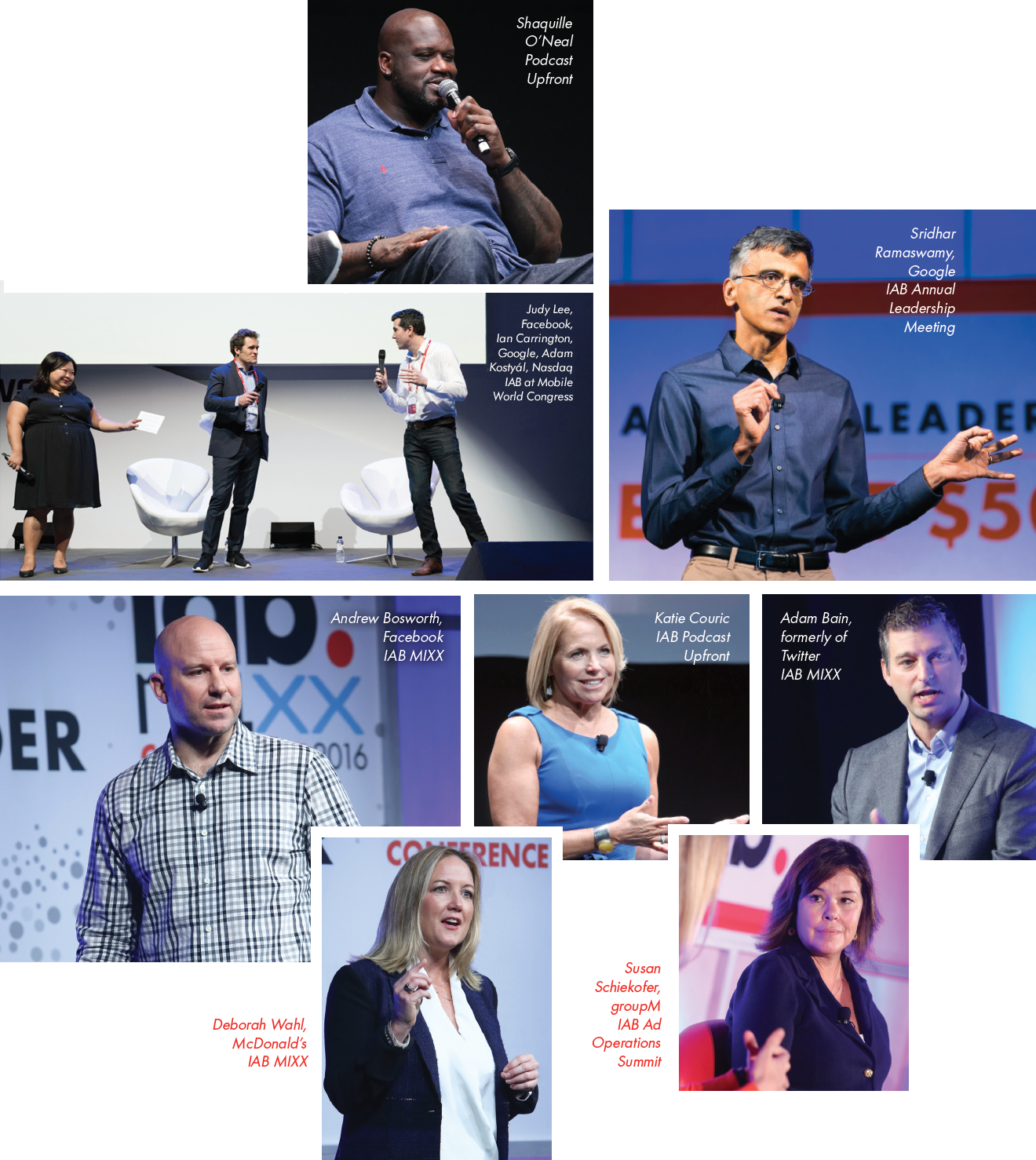
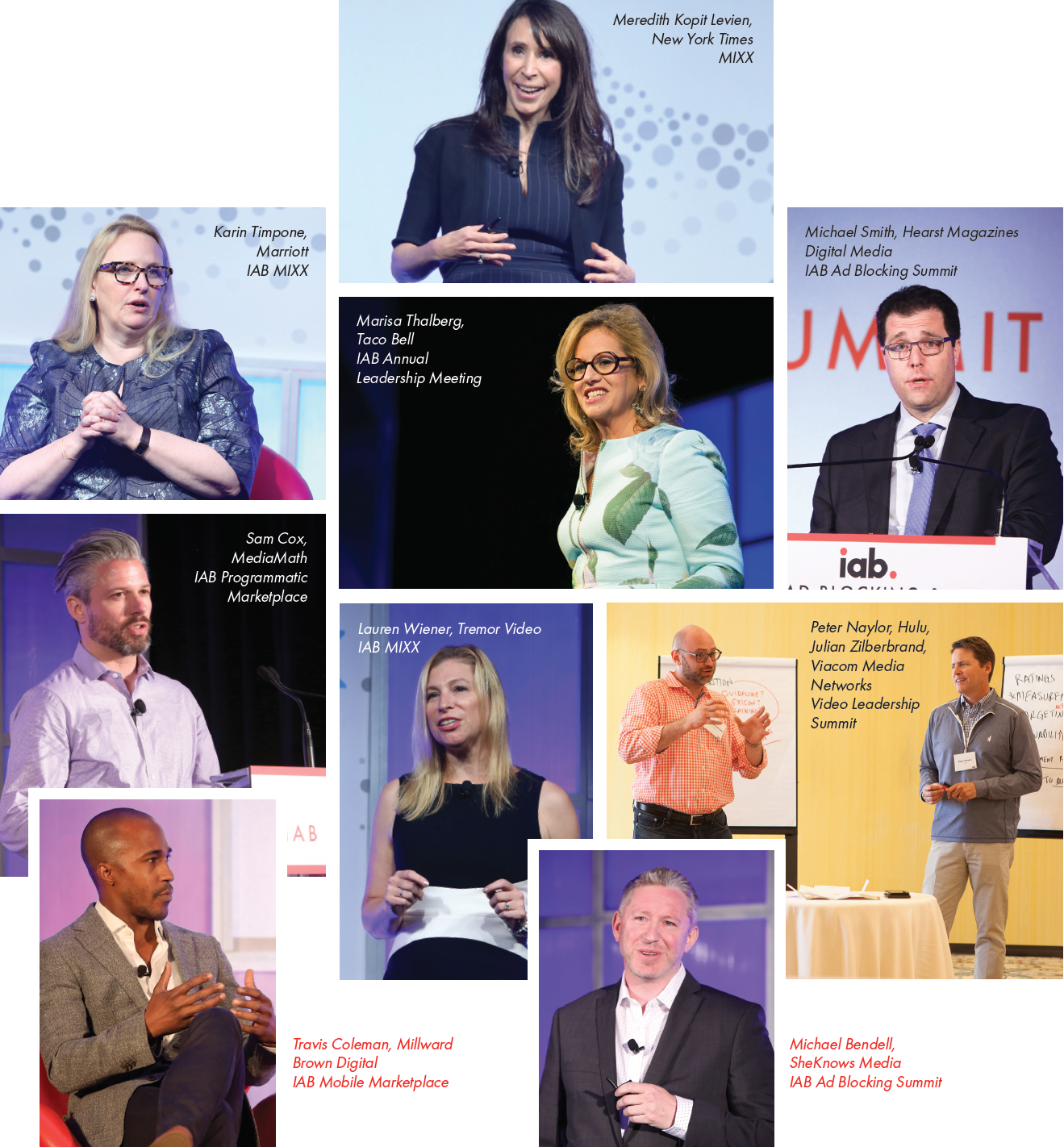
Creativity
Recognizing World-Class Creativity to Engage and Delight Consumers
Digital advertising is largely a child of technology, and as a result, it’s been oriented around systems and processes, rather than the aesthetics and ideas that captivate hearts and minds and allow brands to change consumer behavior. To refocus the industry toward truly inspiring creative, in 2016 IAB shared insights from senior leaders in the industry on the best practical ways to improve user experience, as well as thought-provoking perspectives to further spark creative thinking.
Improving Digital Ad Experiences on Mobile Platforms
Consumers with increasing fluidity are moving across devices in an ever more mobile landscape. The challenge for advertisers lies in how to unlock the kind of creativity to engage and delight consumers in these momentary environments by delivering the most relevant message at the right time and place. In June 2016, IAB released a white paper—in partnership with Kargo and Refinery29—that revealed nearly three-quarters (73%) of marketers and media agency executives believe that user experience needs improvement in digital marketing. The survey’s 283 respondents cited ad clutter as the biggest obstacle to quality user experience (54%). The report offers insights from senior leaders in the industry including Lars Bastholm, Global Chief Creative Officer, The ZOO at Google; Jed Hartman, Chief Revenue Officer at The Washington Post; and David Sable, Global Chief Executive Officer of Y&R on the best practical ways to improve user experience.
IAB@Cannes: Why World Class Creativity Will Obliterate Ad Blocking
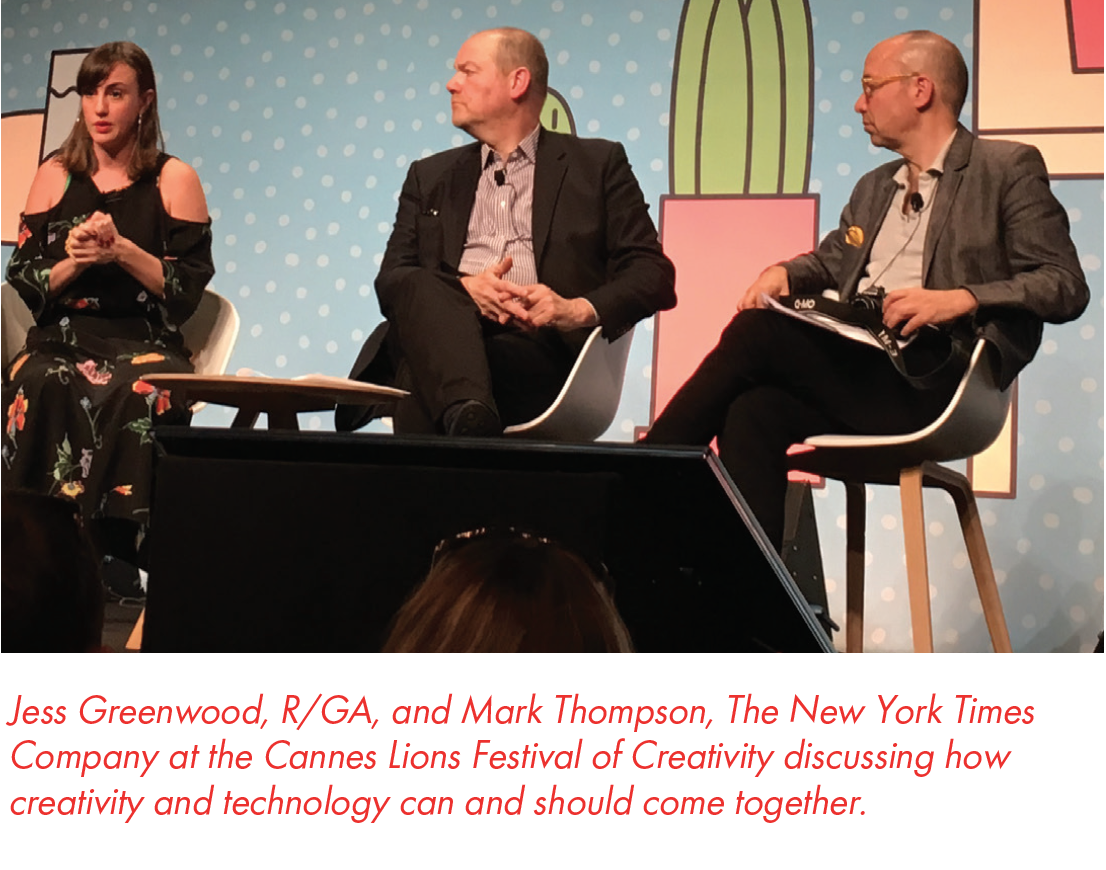 Putting user experience first is crucial to maintaining the open, ad-supported web and its wealth of free news, information, and entertainment offerings. IAB has helped lead the way by championing the LEAN scoring system, by convening an Ad Blocking and User Experience Summit, and by hosting an incredibly popular session at Cannes called “BLOCK YOU: Why World Class Creativity Will Obliterate Ad Blocking” that featured Mark Thompson, President and CEO of The New York Times Company, and Jessica Greenwood, Vice President, Content & Partnerships at R/GA.
Putting user experience first is crucial to maintaining the open, ad-supported web and its wealth of free news, information, and entertainment offerings. IAB has helped lead the way by championing the LEAN scoring system, by convening an Ad Blocking and User Experience Summit, and by hosting an incredibly popular session at Cannes called “BLOCK YOU: Why World Class Creativity Will Obliterate Ad Blocking” that featured Mark Thompson, President and CEO of The New York Times Company, and Jessica Greenwood, Vice President, Content & Partnerships at R/GA.
A Master Class In “What Works and Why in Digital”
To help educate and improve digital advertising, IAB tapped into the MIXX Awards and expert analysis from creative luminaries, brand marketing powerhouses, and blue-chip publishers in a report on “What Works and Why in Digital: IAB MIXX Awards 2016 Insights Report.” The report features insights from Michael Lebowitz, Founder and CEO of Big Spaceship who chaired the IAB MIXX Awards jury; Nick Law, Global Chief Creative Officer at R/GA; Mark D’Arcy, Vice President and Chief Creative Officer of Facebook Creative Shop; and Linda Boff, CMO of GE; among others. The report presents the best-of-the-best in digital marketing that brands and agencies alike can apply to their creative thinking.
IAB MIXX 2016
The 2016 IAB MIXX conference was themed “Advertising’s New World Order,” acknowledging the innovation and chaos seen on every platform, as well as consumers’ demand for more original, personal, and provocative experiences. Among the influential speakers at the event were Deborah Wahl, Senior Vice President and CMO of McDonald’s; Bryan Weiner, Executive Chairman of 360i; and Adam Bosworth, Vice President, Ads & Business Platform at Facebook; to name a few. The event was sold out again in 2016, and the feedback from members and attendees was overwhelmingly positive.
International
IAB International: An Emphasis on Policy
Leveraging the strength and collaboration of the IAB Global Network, and encompassing 44 IAB organizations across six continents, in 2016, IAB International was intently focused on global policy initiatives, including coordinating policy across borders and encouraging proactive industry self-regulation.
Ad Blocking and Standards in a Global Context
Publishers in countries such as France, Sweden, Germany, the Netherlands, and the U.K. are putting DEAL (Detect, Explain, Ask, and Limit – a recommended approach for publishers to connect with ad blocking consumers) into action. Publishers are actively engaging with their users and proactively communicating with consumers about the importance of digital advertising. International companies—members of the IAB Global Network—continue to submit requests for the exclusive ad blocking detection script from the IAB Tech Lab.
Before the IAB New Ad Portfolio was released for open public comment, it was previewed with IAB Europe’s Brand Advertising Committee, presented at an IAB Tech Lab event in London, and discussed with the representatives from IAB Global Network at the IAB Global Summit. International IABs have encouraged their members to participate in the public comment period, ensuring global input.
Overall, 2016 marked a growing spirit of collaboration in the international marketplace. IAB expects increased activities in all of these countries and across borders in 2017 and beyond to help government entities understand which regulations can be good for the industry and to promote responsible growth.
IAB Global Summit
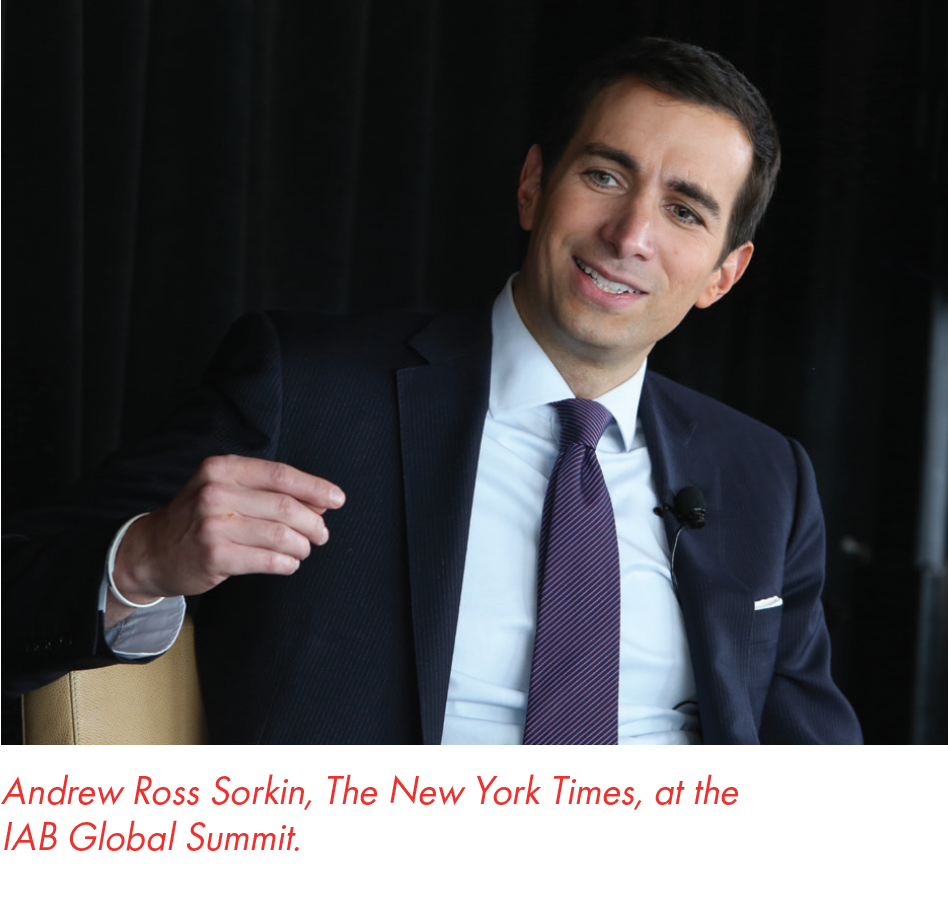 The annual IAB Global Summit welcomed industry leaders from around the world for an invitation-only event exploring the theme “Putting Consumers First: Refocusing the Global Digital Advertising Industry.” On September 28 and 29, 2016, over 100 senior executives from global brands, media agencies, publishers, and ad technology companies, from 30 countries, convened in New York City—with day one graciously hosted by Bank of America at the Bank of America Tower at One Bryant Park—to discuss the salient issues that affect us locally and drive us globally. The two-day event included Town Halls on policy, ad fraud, and transparency; the digital video; the IAB Tech Lab, LEAN scoring, and the new flexible ad portfolio; optimizing data usage; and training, talent, and diversity.
The annual IAB Global Summit welcomed industry leaders from around the world for an invitation-only event exploring the theme “Putting Consumers First: Refocusing the Global Digital Advertising Industry.” On September 28 and 29, 2016, over 100 senior executives from global brands, media agencies, publishers, and ad technology companies, from 30 countries, convened in New York City—with day one graciously hosted by Bank of America at the Bank of America Tower at One Bryant Park—to discuss the salient issues that affect us locally and drive us globally. The two-day event included Town Halls on policy, ad fraud, and transparency; the digital video; the IAB Tech Lab, LEAN scoring, and the new flexible ad portfolio; optimizing data usage; and training, talent, and diversity.
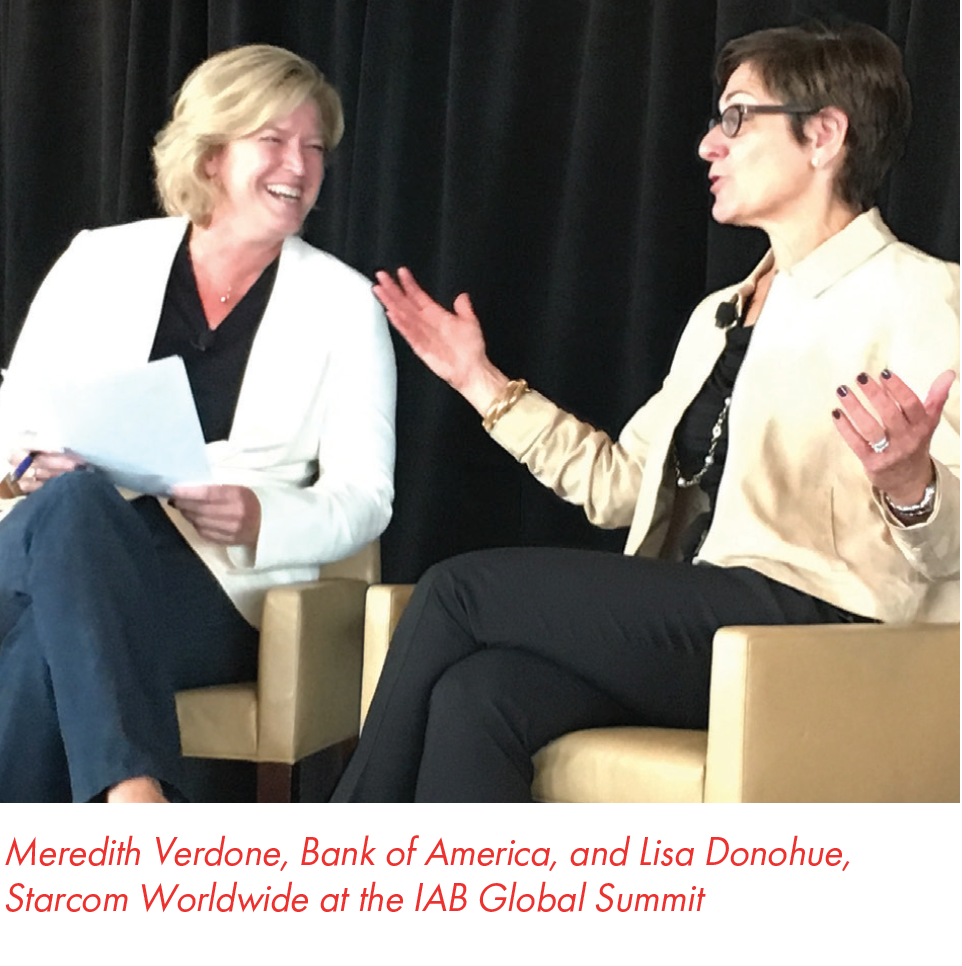 Meredith Verdone, Senior Vice President, Enterprise, Consumer & Global Wealth, and Investment Management Marketing Executive at Bank of America, was interviewed by Lisa Donohue, Global Brand President of Starcom Worldwide, about how to move a brand forward and use technology to connect to consumers, drive innovation, and compete in an environment where disruption is the norm. Meredith Kopit Levien, Executive Vice President and CRO of The New York Times Company, joined Andrew Ross Sorkin, Financial Columnist at The New York Times, to discuss the importance of credible reporting, and what works across boundaries and media borders. Su Tong, Founder and CEO of Hylink Digital Solutions, provided insights on ever-growing Chinese market and how to engage with it. Jim Norton, now Chief Business Officer, President of Revenue at Condé Nast, and 2017 Chair IAB Board of Directors, presented in his former role as Global Head of Media Sales at AOL, and discussed how to structure and service global ad partnerships. And Jessica Greenwood, Vice President, Content & Partnerships at R/GA explored key user experience challenges and the importance of creativity in solving them.
Meredith Verdone, Senior Vice President, Enterprise, Consumer & Global Wealth, and Investment Management Marketing Executive at Bank of America, was interviewed by Lisa Donohue, Global Brand President of Starcom Worldwide, about how to move a brand forward and use technology to connect to consumers, drive innovation, and compete in an environment where disruption is the norm. Meredith Kopit Levien, Executive Vice President and CRO of The New York Times Company, joined Andrew Ross Sorkin, Financial Columnist at The New York Times, to discuss the importance of credible reporting, and what works across boundaries and media borders. Su Tong, Founder and CEO of Hylink Digital Solutions, provided insights on ever-growing Chinese market and how to engage with it. Jim Norton, now Chief Business Officer, President of Revenue at Condé Nast, and 2017 Chair IAB Board of Directors, presented in his former role as Global Head of Media Sales at AOL, and discussed how to structure and service global ad partnerships. And Jessica Greenwood, Vice President, Content & Partnerships at R/GA explored key user experience challenges and the importance of creativity in solving them.
Who is IAB?
FOR GENERAL INFORMATION ABOUT IAB, PLEASE CONTACT US AT:
Interactive Advertising Bureau
116 East 27th Street, 6th Floor
New York, New York 10016
212 380 4700
www.iab.com
Executive Committee 2016
Board President
Randall Rothenberg
President and CEO
Board Chair
Lauren Wiener
Tremor Video
Board Vice Chair
Jim Norton
Condé Nast
Joe Apprendi
Collective
David Morris
CBS Interactive
Scott Schiller
NBCUniversal
Vivek Shah
Ziff Davis, LLC
Rik van der Kooi
Microsoft Advertising
Ex-Officio Member of Executive Committee
David Moore
Xaxis
Board of Directors 2016
Lee Brown
BuzzFeed
Seth Dallaire
Amazon Media Group
Mark Ellis
Time Inc.
Rick Erwin
Acxiom
Eric Franchi
Undertone
John Frelinghuysen
Disney | ABC Television
Keith Grossman
Bloomberg Media
Jed Hartman
The Washington Post
Mark Howard
Forbes Media
Allie Kline
AOL
Meredith Kopit Levien
The New York Times Company
Seth Ladetsky
Turner Broadcasting System
Warren Lapa
Spectrum Reach
Mark Lopez
Univision Communications Inc.
Jean-Philippe (JP) Maheu
Twitter
Kirk McDonald
PubMatic
Marian Pittman
Cox Media Group
Penry Price
LinkedIn
Sridhar Ramaswamy
Google
Michael Rubenstein
AppNexus
Brad Smallwood
Facebook
Jeremy Steinberg
The Weather Channel
John Trimble
Pandora
Lisa Utzschneider
Yahoo!
Lisa Valentino
Condé Nast
Jacob Weisberg
Slate
Rick Welday
AT&T AdWorks
Troy Young
Hearst Magazines Digital Media
Joe Zawadzki
MediaMath
Former 2016 Board Members
David Brinker
News Corporation
Paul Caine
Bloomberg Media
Frank Cooper
BuzzFeed
Jory Des Jardins
SheKnows
Michael Friedenberg
IDG Communications
Joan Gillman
TWC Media
Eric Johnson
ESPN
Harold Morgenstern
Discovery Communications
Neal Mohan
YouTube
Ex Officio
Venable LLP
Archer Advisors
Charter Communications
Interactive Advertising Bureau (IAB) empowers the media and marketing industries to thrive in the digital economy. It is comprised of more than 650 leading media and technology companies that are responsible for selling, delivering, and optimizing digital advertising or marketing campaigns. Together, they account for 86 percent of online advertising in the United States. Working with its member companies, IAB develops technical standards and best practices and fields critical research on interactive advertising, while also educating brands, agencies, and the wider business community on the importance of digital marketing. The organization is committed to professional development and elevating the knowledge, skills, expertise, and diversity of the workforce across the industry. Through the work of its public policy office in Washington, D.C., IAB advocates for its members and promotes the value of the interactive advertising industry to legislators and policymakers. Founded in 1996, IAB is headquartered in New York City and has a West Coast office in San Francisco.
Staff
PRESIDENT & CHIEF EXECUTIVE OFFICER
Randall Rothenberg – [email protected]
EXECUTIVE VICE PRESIDENT & CHIEF OPERATING OFFICER
Patrick Dolan – [email protected]
EXECUTIVE VICE PRESIDENT & CHIEF MARKETING OFFICER
David Doty – [email protected]
EXECUTIVE VICE PRESIDENT PUBLIC POLICY
Dave Grimaldi – [email protected]
SENIOR VICE PRESIDENT AND GENERAL MANAGER, MOBILE AND VIDEO CENTERS
Anna Bager – [email protected]
SENIOR VICE PRESIDENT, DATA AND AD EFFECTIVENESS, AND GENERAL MANAGER, IAB DATA CENTER
Dennis Buchheim – [email protected]
SENIOR VICE PRESIDENT, TECHNOLOGY AND AD OPERATIONS, AND GENERAL MANAGER, IAB TECH LAB
Alanna Gombert – [email protected]
Phil Ardizzone
Senior Director, Sales
[email protected]
Christa Babcock
VP Learning and Certification
[email protected]
Laura Baker
Senior Manager, IAB Ad Lab
[email protected]
Val Baron
Director, Video
[email protected]
Kevin Blouin
Senior Manager, Business Operations
[email protected]
Susan Borst
Deputy Director, Mobile
[email protected]
Erika Bradbury
Director, Conference Programs
[email protected]
Diana Braithwaite
Coordinator, Education Foundation
[email protected]
Luz Brito
Manager, Finance
[email protected]
Jeanie Carstensen
VP, Finance and Operations
[email protected]
Sara Childs
Coordinator
[email protected]
Jennifer Derke
Senior Manager, Product Management
[email protected]
Benjamin Dick
Director, Data & Ad Effectiveness
[email protected]
Jennifer Dutko
Executive Assistant
[email protected]
Enxhi Dylgjeri
Manager, Video
[email protected]
Zhana Edmonds
Senior Manager, Events
[email protected]
Ilham Elkatani
Manager, Product Manager
[email protected]
Chris Glushko
VP, Marketing
[email protected]
John Grifferty
Senior Manager, Member Relations
[email protected]
Natalie Hamingson
Coordinator, Member Services
[email protected]
Megan Hauck
Director, Education Foundation
[email protected]
Conor Healy
Director, IT
[email protected]
Skylar Hogan
Coordinator Events
[email protected]
Eric John
Deputy Director, Video
[email protected]
James Linney
Manager, Events
[email protected]
Margaret Maxwell
Coordinator, Education Foundation
[email protected]
Courtney Mcdermid
Executive Assistant
[email protected]
Lauren Milligan
Senior Manager, Marketing
[email protected]
Mayank Mishra
Senior Director, Engineering
[email protected]
Diana Negron
Executive Assistant
[email protected]
Shira Orbach
Senior Manager, Marketing & PR
[email protected]
Edwin Orta
Senior Facility Manager
[email protected]
Mina Pajevic
Coordinator, IAB Tech Lab
[email protected]
Dharmik Patel
Software Engineer
[email protected]
Myrna Perez
Coordinator, Finance
[email protected]
Alexander Propes
Director Public Policy
[email protected]
Bandita Ray
Coordinator, Data Entry & Integrity
[email protected]
Kori Reese
Executive Assistant
[email protected]
Kenya Reynolds
Senior Manager, Mobile & Video
[email protected]
Brendan Riordan-Butterworth
Senior Director, Technical Standards
[email protected]
Virginia Rollet Moore
VP, Events
[email protected]
Nicole Ross
Senior Director, Member Services
[email protected]
Soizic Sacrez
Director, Marketing
[email protected]
Alexandra Salomon
Senior Director, International
[email protected]
Amit Shetty
Director, Product, Video & Audio
[email protected]
Colleen Shields
Senior Manager, Business Ops & Events Marketing
[email protected]
Tina Shih
Director, Marketing
[email protected]
Shailley Singh
Senior Director, Product and Research & Development
[email protected]
Janet Slavinsky
Director, HR
[email protected]
Kristina Sruoginis
Director, Research
[email protected]
Christopher Staley
Manager, SF AD LAB and Office Manager
[email protected]
Brooke Stevens
Account Manager
[email protected]
Michael Texidor
Director, Certification Operations
[email protected]
Brianna Theobald
Coordinator, Learning & Development
briann.theobald.com
Brad Weltman
VP, Public Policy
[email protected]
Claire Whalen
Manager, Events
[email protected]
Yashica Wilson
Director, Enterprise Certification Programs
[email protected]
Eva Wu
Senior Manager, Mobile & Emerging Platforms
[email protected]
Maggie Zhang
Senior Director, Digital Video Research
[email protected]
Melody Zimmer
Director, Learning & Development
[email protected]
Expanding Influence
